#and then forcing me in hijab while not having a community around us
Explore tagged Tumblr posts
Text
Still thinking abt not knowing my skirt had a slit in it so I wore pants underneath and my mom made a joke to her friend who was taking a picture of me like “remember she’s Muslim….very modest” like because the woman wanted me to show off the slit (???) Why would you say that are YOU not Muslim ? How can you say that to someone you forced into full hijab while not wearing it your goddamn self.
#like this is becoming an I hate my life blog again but like#i can’t go to a therapist abt it#I’m stuck here a#like ???#also it was a pretty flowy skirt and if I’m facing Straight#you wouldn’t see the slit anyway like for me to intentionally stand like that would be weird#but like…if you’re Muslim would you even say that to another Muslim?#that’s like as a black person saying something moderately racist to laugh with your white friends#this woman isn’t Muslim#my mom is giving appropriator because no fucking way#this is after her 10 minute monologue abt Ramadan +Zakat like. whenever she’s near non Muslims she’s constantly mentioning she’s Muslim#but when it’s just us she’s eye rolling or calling Muslims terrorists in roundabout ways like#literally let me leave I cannot stand being here#how dare you say that to me after giving me a full Arabic name first/middle/last#putting me in a mosque for years#and then forcing me in hijab while not having a community around us#Hala talks#blacklist me ranting it’s gonna be a full day#then she said sleeping during the day#was haram during Ramadan I disagreed with her because like there are Muslims in like Iceland and the sun is only down an hour#and I could tell by the way her friends and thier kid reacted that it’s like I thing that I’m ‘disrespecting her’ and that ‘children don’t#know how to talk to thier parents’#it’s a common thing I can tell that they all believe that im just a bad kid and she’s the hard working mom or whatever because she calls all#our conversations arguments#I’ve heard her do it multiple times and I called her out#and now they’re offering to help me drive but they’ve been brainwashed by this woman to believe all her kids hate her for no reason
1 note
·
View note
Text
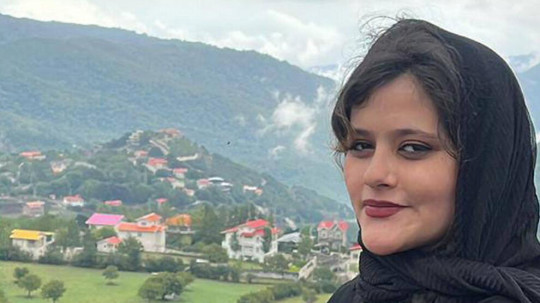
When she was a baby, she was given the nickname, “Schne”. Translated it means "a gentle breeze."
“She was a young woman who loved to sing, dance and travel,” according to writer Deutsche Welle.
But, in her country, like many countries, she didn’t have the freedom, to be herself, to even allow her hair to be caressed by a gentle breeze.
According to journalist and activist Masih Alinejad, “Schne” had told her mother:
I can’t choose what I wear . . . I don’t have the right to dance in public. By law, I’m not allowed to be myself. “‘I’m already dead,’” she said, according to journalist and activist Masih Alinejad.
She knew the dangers.
There was an ever-present fear of the police and the Guidance Patrols, widely known as "morality police," her aunt says.
“But when I go to the streets,” she said. “I have a dream. And that makes me alive.”
In 2022, Jina “Mahsa” Amini was with family visiting her brother when she was arrested for “improperly” wearing her hijab, according to Forbes. She was brought to a police station.
Her aunt says she heard what happened from one of the two cousins who avoided detention, according to Welle. She resisted being arrested, but she was still forced into the vehicle. The cousin followed the "morality police" to the police station, she says, and around two hours after the young woman’s arrest, some young women ran out of the station screaming "They killed her!"
According to writer Maggie McGrath, “after reports of the horrific incident emerged (thanks in part to reporters Niloofar Hamedi and Elahe Mohammadi, whom the Iranian regime has since jailed), protests erupted across Iran. They were led by women who tore off their hijabs, cut their hair and adopted a rallying cry of ‘women, life, freedom.’”
March 8 was International Women’s Day.
“Over 2.5 billion women and girls around the world are affected by discriminatory laws and the lack of legal protections, often in multiple ways,” according to the United Nations.
See the UN’s Infographic on Women's rights and the law in comments below.
In a speech ahead of International Women’s Day, United Nations Secretary General Antonio Guterres warned, “Decades of global progress on women’s rights are ‘vanishing before our eyes,’ arguing sexual abuse, a lack of educational and employment opportunities and the rollback of reproductive rights have pushed the goal of gender equality ‘300 years away.’”
“It's a fundamental human right for girls and women to live autonomous lives, building futures for themselves that reflect their innermost dreams and desires,” said Jessica Giusti, deputy director of communications for Girl’s Up, writing for Newsweek. “But sweeping attacks on female agency—bodily, intellectually, and otherwise—from Afghanistan, to Iran, to the United States and beyond, deny girls and women their power and capacity to thrive.”
This is a new story for the Jon S. Randal Peace Page. The Peace Page focuses on past and present stories seldom told of lives forgotten, ignored, or dismissed. The stories are gathered from writers, journalists, and historians to share awareness and foster understanding, to bring people together. And, as such, the stories this month for Women’s History Month are never relegated to one single month - they are available all year in the Peace Page archives and on this page each week throughout the year. We encourage you to learn more about the individuals and events mentioned here and to support the writers, educators, and historians whose words we present.
~~~~~
Ashkan Amini, Jina Mahsa Amini's brother, wrote on Instagram on October 11, 2022:
"We never imagined the day would come when our mother would fall asleep crying on your bed, while our father sat in the corner of the room hiding his tears from us, and that I wouldn't be able to bring myself to open the glove box of my car in case I caught sight of your hijab. ... My only wish is to embrace you one more time ..."
“For girls and women the world over, the fight for humanity and dignity is as alive as ever,” wrote Giusti.
“Girls in Afghanistan are forbidden under order of the Taliban to attend public and private universities, following an edict . . . that kept children and young women from continuing their middle school and high school educations. The strict dress code enforced by Iran's "morality police," which launched massive, ongoing protests . . . following the death of 22-year-old Jina "Mahsa" Amini, while in police custody, prevents girls and women from expressing their own individualism, religion, and cultural identities safely and authentically.”
UN Secretary General Guterres pointed to Taliban-controlled Afghanistan, where he said “women and girls have been erased from public life . . . girls have been barred from attending school past the sixth grade and women have been ordered to cover their faces in public and stay at home unless of a case of necessity.”
“In Ukraine, investigators have found widespread instances of sexual abuse by Russian forces, following the Kremlin’s invasion of the country last year, including rape and forced nudity—Russian officials have denied allegations its troops have committed human rights abuses on civilians. A U.N. report released in November found instances of Russian troops targeting girls as young as four years old and as old as 80.”
~~~~~
“Women's History Month is not just about celebrating famous figures but also about recognizing everyday heroes who make a difference in their communities,” according to writer Tricia Goss.
“On International Women’s Day, do we pay enough attention to those courageous women breaking new ground for the next generation, whether they are pointed out to us by international film crews in faraway places or whether they are right here serving others at our local nonprofits?,” wrote Susana Villegas of the San Diego Union Tribune.
“Mahsa Amini is now a global symbol for freedom, not just in Iran,” says Nina Ansary, a historian and women’s rights activist.
She was an ordinary woman to whom thousands could relate, according to Hadi Ghaemi, the founder of the Center for Human Rights in Iran. “She wasn’t an activist. Her face and her experience were very intimately and tangibly familiar to every family in Iran, because every time their mothers, sisters, and their daughters go out of the house, they have been harassed by the morality police, or detained or even beaten.”
Like Mahsa Amini, there are "anonymous mothers, daughters, grandmothers, granddaughters, sisters, aunts and childhood friends whose faces we see in the news demonstrating on the streets and in the schools of Tehran, Mexico City, Delhi, Tigray, Kabul, Abuja, Islamabad, Manila, and, yes, Washington, D.C. Namelessly, they persevere to simply exercise their rights to be who they choose to be.”
On Mahsa Amini’s tombstone is written "Dear Jina, you won't die. Your name will become a symbol."
~ jsr
The Jon S. Randal Peace Page
235 notes
·
View notes
Note
I came across this muslim woman on tiktok who wears a niqab. It seems like most of her tiktoks are about being muslim so I was interested but honestly it's kind of depressing. This particular tiktok "things never to say to a niqabi"really bothered me bc these things to never say are just other women caring about her. Overstepping boundaries but trying to look out for her nonetheless. Its inappropriate to single Muslim women out in public or something but what in the world is wrong about a woman being worried her friend who's covered from head to toe in black fabric might overheat on a hot day? https://vm.tiktok.com/ZMeuAKo5n/
id say a lot of it sounds like ignorant and rude statements and all but the one about “don’t you get hot with all those layers”... girl ive grown up around women dressed similar to this and i think it very frequently esp bc Bahrain is SO HOT. i just think, “wow, that must be really difficult for them.” “wow, it sucks they feel that that’s how they should/must dress.”, ive had to wear an abaya while walking around in my village and it’s hot!!! it’s black and we wear clothes underneath too!
western hijabis & niqabis seem to care a LOT about making it seem like it’s a choice and women usually choose to dress that way but i just want to emphasise this “choice” as someone who grew up & lives in a muslim country & is of muslim background:
1. we’re told from a VERY young age that we should *at least* wear a hijab.
2. we’re told that we’re better, purer, modest, cleaner, etc if we do wear the hijab
3. we’re told by the kids around us stuff like, “how old are you? 7? you do know you’re going to go to hell if you don’t wear it right?”
4. we’re told in school, in our classes, that if we don’t wear it we’ll go to hell
5. we’re taught that if we don’t wear it, it’s basically our fault that men sexually harass us. and if we don’t want to face that, we should wear it.
6. we’re told women can’t go to heaven if they show their hair
7. we’re told god will view us as better if we wear it
8. we grow up seeing the vast majority of women around us wearing it
9. some of us will face extra pressure from our parents to wear it, and some of us will be downright forced to
10. some of us will face literal threats if we don’t wear it
11. some of us are told that it’s a symbol of pride in our heritage. if we don’t wear it, we’re told we must be ashamed of our cultural background
12. if we choose not to wear it, we face obvious judgment and scorn from those around us
13. many people around us will call us names and openly belittle us for not wearing it
14. men often view us not wearing it as an invitation for sexual harassment
15. in several countries, women who don’t wear the hijab *will* be stopped and interrogated, sometimes by people in positions of authority.
16. in some countries, women will face risk of imprisonment for not wearing it.
17. if you DO feel shamed & pressured enough to wear it & then eventually decide u want to remove it.. then you will be looked down on and told u can’t remove it, that it’s disrespectful, and harassed even more than if u never wore it
18. never mind the pressure you’ll feel if you’re the only woman in your family not wearing it
these are just off the top of my head. women have literally faced acid attacks and honour killings over this shit, many of us have been raped and abused and then told it was our fault & then compared to uncovered lollipops that catch flies. the women that claim “it’s a choice” are completely ignoring the pressure we face from society, from people within the community, from the teachings. they ignore that very often we will be downright forced. “it’s a choice”, except a huge portion of hijabis “chose” to wear it at 7 or 8. “it’s a choice” except a huge portion were being told & indoctrinated their whole lives that if they don’t wear it they’ll be tortured by scorching fires for eternity. so when western hijabis & niqabis want to pretend it’s a choice, that it’s not oppressive, w/e else... not only are they spitting on the majority of women who had little to no say, but they’re justifying and erasing the inherent misogyny and the constant implicit + explicit pressuring muslim women face.
997 notes
·
View notes
Note
I am the person from a few days ago who was struggling to differentiate between allistic and autistic versions of autistic traits. The problem for me with the autism criteria in trying to figure out between allistic and autistic is that while I meet the criteria for part B and relationships in part A, I feel my differences in social-emotional reciprocity and nonverbal skills are more a lack of interest. This is multiple long paragraphs, so feel free to skip to the Too long; did not read at the end or to just ignore this ask. It has always been my belief that expectations of a service should be proportional to cost, and as you are free you have no obligation to reply. Also, I know other diagnoses are a possibility, and I am officially diagnosed with ADHD, but it does not seem to fit well and based on the complete lack of effect from medication I doubt it is the cause of my issues.
I cannot tell what my listener is feeling. But I think it is not because I cannot identify emotions, but more because I do not care. I do not think I had to spend too long to figure out emotions but I do not care what people are feeling, and I have always thought it was better to listen to people’s words anyway because that is the real, chosen communication. I do find small talk boring and pointless, but I bet many people do, they only go along with it because it is expected of them, like thanking people for bad gifts, and funerals and dress codes. Who cares if someone wears stretch pants and a t-shirt and is also a lawyer. It does not indicate one's skill to wear a suit. It actually just indicates how wealthy one is. Plus it seems wrong to talk about how important women, trans people, and poor people are before talking about how dress codes are professional when they seem to be used against women, trans people, and poor people. Plus I believe things like the argument of professionalism are used against people of colour, like encouraging Black people to alter their natural hair and while I admit I have not researched this, would restrictions on hair length not impact Sikhs, who I believe are not permitted to cut their hair. Plus differing standards of hair based on gender reinforce gender binaries and can harm trans people. And haircuts are expensive, and even more expensive for women, I believe. Plus the focus on women covering their bodies is sexist and part of victim blaming, and also seems hypocritical when people try to ban Islamic women's body coverings like burkinis and hijabs, or force women's teams to wear more revealing uniforms. There is nothing sexist about a woman choosing to wear revealing clothing or a hijab. It is only sexist when people try and take women's choice away and so in restricting choice, the dress code is clearly sexist. And even if exceptions are made, there is a wrongness in that. Because not everyone can prove they are what they say they are. It can put pressure on trans people to need to be sure about gender instead of being free to explore, and maybe someone needs dress code exceptions due to disability, but not everyone has the means to prove disability, and really why are such arbitrary rules like dress code used when clothing says nothing about actual capability. I also focus more on correct use of words in conversation, but that is actually very important. When things are ill-defined how can we have a reasonable argument. I have also been told I go a bit far in making arguments in debate, and some people have found it rude when I attempted to get them to define something more accurately. But they should have told me if it was too much. How am I supposed to know they want me to stop if they do not tell me? I do struggle to initiate conversations, but I think it might be due to a sense of discomfort around strangers. I can initiate conversation more easily with people I know. I think it helps that small talk can be skipped over and we can head straight to the ethics questions or monologues about what I learned. But again, I think it might be a mix of social discomfort and getting bored with people, not that I cannot do it, but I do not want to.
I can make eye contact. I dislike it with strangers, but it is harmless with people I am more familiar with but I still only make it on occasion. Not because it is difficult, but I really do not see the point in looking at who you are talking too. This might also be why I do not feel what they feel during conversations, because I guess I make no effort to look. It just seems like a weird thing to enforce, but I can do it. I can do facial expressions. I have actively sought to add new ones to my repertoire by observing television. There is an occasional mismatch between tone and facial expression with me, but I can do correct tone with little effort. I find mostly that my face is neutral, and my tone is flat, but if I am interested in the topic I can sound excited and I think my face may be more expressive. I am also good at using a sarcastic tone, though I have found that by saying odd statements in my neutral voice they can be occasionally mistaken for sarcastic jokes even though I meant them seriously. But I again think that my nonverbal differences are more due to lack of interest than an actual inability. I think my nonverbal communication used to be worse, but when I decided to improve it in my late teens, I did not find it difficult to incorporate new body language, so it really does seem to come from a lack of interest instead of an incapability like in autism.
I never really fit in with other people, but it also never troubled me. Many people are very illogical, and overly attached to traditions and ideas they refuse to question. Sometimes it feels like I am better than them, and that if they could be like me they would be happier. And they do things wrong. I have watched so many times as people choose inefficient methods to perform tasks, and they never let me be in charge even though I am better. I found it extremely frustrating in high school and when I worked to be in groups with others because they would not do things my way, and I have the superior methods. If I could be left alone and completely in control I would be at my best. But also, when they give me a task they are too open-ended I struggle. They never clearly explain what they want, and they say stuff like "Go above and beyond," but if they want something specific done they should say so. If I asked for something to be done and someone added on to it without first discussing it with me I would be angry. And it is mentally exhausting to have to listen to people’s complaints about no one liking them, or weddings being expensive even though they chose to make it important and expensive, and how they are sad they have acne (I understand for the more painful kind, but I still have acne as an adult and it only adds extra details to the face to better distinguish me from the masses). And they never like talking about interesting things like death or ethics or questioning how our morality is developed and what the nature of good is. People deeply annoy me for this reason because they are so different in such a wrong way and they are not like me but they keep treating me like one of them. They called me callous, but I think I have more sympathy than them. I actively think about morality and apply logic to it and think about things all the time and actually make an effort to learn. And it seems to be more painful to me to do so, because I liked the more rigid way I used to see the world and I want to treat people like me instead of the way they seem to actually want to be treated. They taught me that you cannot assume what people want or how they feel based on what you as an individual want and feel because I was different, but because they have always been the majority they never even stop to think that I might be different and not want the pathetic things they want.
I hoped autism would be an explanation I could use. I do actually struggle. I work so hard to be less rigid and to be more sympathetic even though my way is better, but I get nothing for it and it is so easy to fall back into the way I used to be an I have to relearn and get used to caring and being flexible again and all the while people keep adding on to that and being wrong and it is so frustrating to always have to change for other people, especially when my way is better and their way is wrong and illogical. I hate being around people and I need time alone. I feel uncomfortable around those I am not familiar with and it is exhausting to have to put up with them at work or school. And I do have issues with sound and taste, and I would like those properly acknowledged. I have to be careful to get enough nutrients through supplements because I tend to eat restricted selection of good texture and taste foods and it is easy to fall into the trap of safer foods being too much effort to make so I skip meals, and then I am even more tired and making food is too much effort again. And people make so much noise and it is unpleasant and distracting and while I do use subtle earplugs they do not shut everything out completely and people feel I am being disrespectful even when I can hear conversation perfectly fine with my earplugs in. And they do not like it when I tell them to talk more quietly, even though they think it is perfectly acceptable to tell me to talk louder. Having to be around people and dealing with the sensory stuff is very draining. I start to feel unmotivated and disconnected after long periods of being around them. I felt miserable in high school, and when the pandemic came we were more isolated I was happier, but when they had us come back to university campus everything got bad again. People try to tell me I am depressed, but my low moods are very tied to what is going on around me. If people left me alone and if I could get accommodations, I might do better.
Too long; did not read: I do struggle with social stuff and have always felt very different, and it is hard for me to be around people and very exhausting, but I feel I do not truly meet the autism criteria, because my emotional and nonverbal skills are more absent due to lack of interest and understanding of purpose instead of true inability. I do feel I would benefit from some formal acknowledgement of difference and my traits are difficult for me, but they also do not seem to be autism enough and I am uncertain of what to do. I do feel an official diagnosis I can use of anything would help, because no one will listen to me without proof. Thank you for your time. Your efforts are appreciated, and I understand if you have nothing to contribute and would rather ignore this ask.
mate… this is pretty much textbook autism. lack of interest in other people and desire to do things in a strictly logical fashion are also traits associated with a couple personality disorders, so if you’re looking for something else to check as an alternative diagnosis, try:
obsessive compulsive personality disorder
schizotypal personality disorder
narcissistic personality disorder
that being said, nothing you’ve said would exclude you from an autism diagnosis. there is no reason that everything you describe could be solely due to autism. I’ll include some quotes from the DSM that might help you!
first — “deficits in developing, maintaining, and understanding relationships, including… lack of interest in peers”
many autistic people are completely uninterested in other people. many autistic people hate most people. many autistic people are completely unbothered about the idea of friendships and other relationships. personally, I love my friends… but I’ve never gone out of my way to form a friendship. this is not uncommon.
it’s also quite common for autistic people to take communication “at face value”. that is — listening to the words people are saying as is. this can mean not reading tones or emotions when communicating to others. in turn, we often expect that others will take us at face value, and can get frustrated when people try to read too deeply into statements we make.
second — “difficulties adjusting behaviour to suit various social contexts”
to a non-autistic person, it may seem as though we’re being rude or disrespectful on purpose, but this is often due to misreading social rules and social hierarchies.
autistic people often struggle to learn and process social rules, so many of them just seem nonsensical. you’re right… why should certain clothes be associated with a different status? why should we treat some people with more respect than others?
these social and cultural rules are naturally brought into question when you have to learn almost every social rule by rote. this means we often end up picking and choosing which rules to follow based on which ones actually make sense to us… hence being treated as though we’re being disrespectful for not following a rule that makes zero sense.
third — this is not in the DSM, but you must remember that many autistic people are able to mask
autistic people tend to be good at finding and copying patterns. for some autistic people, this extends to human behaviour.
as a child, I talked like someone from a Victorian novel, so I learnt how to talk more casually by watching TV. I learnt slang terms and body language from Dawson’s Creek and Saved By The Bell. unfortunately, I solely watched 90s and early 2000s shows, so my masking wasn’t super effective.
learning social skills in such a deliberate and practiced fashion is not regular allistic behaviour. most non-autistic people are able to learn these skills as children, simply by watching and copying those around them. it comes a lot more naturally to them, so they rarely have to go out of their way to deliberately learn these skills.
other autistic traits you seem to have are:
strict moral code
happier when isolated
hating group work
getting exhausted from socialising
needing clear instructions
TLDR; nothing you’ve said would be any reason to bring an autism diagnosis to doubt. many autistic people lack interest in social things, and many autistic people get confused about why others get offended by their more logical approach. I think you should investigate the possibility of an autism diagnosis
34 notes
·
View notes
Note
(1/3) hi i'm muslim and i have a totally different perception of samirah. while i know and understand that samirah wasn't the best representation of a muslim american, i don't think she's bad at all. i remember reading the part where she says Allahu akbar and being SO delighted that magnus respectfully asks about it and lets her explain because it's also teaching the readers. and despite arranged marriages being a negative stereotype of muslims, it's a definitely a real thing. BUT it's not
(2/3) forced marriage like the stereotype depicts. also marriage between cousins is real in muslim countries. my grandparents are cousins. afaik the stigma around cousin marriage is a western idea- there was a study that stated it could cause birth defects but it was later disproved. i genuinely think rick did a good job of representing this. samirah and amir clearly like each other and if they didn't their families wouldn't force them to get married bc that's not what arranged marriage is. I DO (3/3) have a prob with how samirah is portrayed as an on/off hijabi. with all the research he did, rick could've checked the rules of hijab. i wish he had just made her a non-hijabi that has a scarf with her bc it's magical and so she can pray when she needs to. he does say that the way she wears it is based on what he saw his students do, which is easy to believe because he taught middle school and i've seen it happen in my own school. i don't really accept it as a valid explanation though.
okay, first things first: i loved samirah when i first read magnus chase. i was so happy to see a muslim character that isn’t just defined by their religion in a fantasy book. i was also 14 at the time and i was so overwhelmed by the fact that she’s muslim that i didn’t realize the flaws in her writing. i’m not gonna talk about the allahu akbar thing because i’m honestly conflicted. the way magnus says that “it’s never said in a positive way” was just... not good. but as you said, it’s a teaching moment so i guess i’ll let it slide. my biggest problem is with her relationship with amir. i know that arranged marriage isn’t always forced. i know that marriage between cousins happen. i know this because i’m a muslim born and raised in a muslim country. i have my personal problems with arranged marriage as a whole but i acknowledge that it’s not always forced marriage. but the way it’s written in the magnus chase books makes me really uncomfortable. first and foremost it’s because she was 12 when they got “engaged”. now, as i said before, i live in a muslim country but arranged marriages here never start this young. you have to at least finish your education first before getting engaged. most people get engaged in their 20s. and the justification for it here? even worse. “When [my mother] died … well, in the local community, I was damaged goods, a bastard child. My grandparents were lucky, very lucky, to get the Fadlans’ blessing for me to marry Amir. I won’t really bring anything to the marriage. I’m not rich or respectable or –” (Magnus Chase, Sword of Summer) this line made me uncomfortable from the moment i read it because it’s samirah beating herself up for something that’s not her fault. her grandparents used her to make the image of their family better (and yes, i know this happens a LOT in muslim societies especially with women but it’s an awful thing that shouldn’t happen) and she’s tying her entire worth to her relationship with amir. yes, i know she had a crush on him since she was 12 but that’s not an excuse to get engaged! i know that some people say that arranged marriage is about choice, but a 12 year old girl can’t make a choice like this especially when she feels so insecure about herself. every time she talks about her grandparents/what they think of her it’s always something negative too. she didn’t agree to this engagement because she had a crush on amir, it’s because she feels guilty over something she had no control over (her mom’s relationship with loki and having her) and wants to fix it by making the family’s image better. again, yes, this happens in muslim communities but it’s not a positive thing and it shouldn’t be portrayed in a positive light by anyone, especially not by an american white guy who thinks he can write something like this just because he memorized a surah and some hadith. i have no problems with other muslims finding representation in samirah al-abbas, i personally think she’s great. but that doesn’t mean that there aren’t any flaws in her writing, especially considering all of RR’s characters of color, especially the girls, have problems like this too.
371 notes
·
View notes
Text
Writeblr Review Help
Hello my lovelies! I’m working on The Stuck Author’s Survival Handbook -- a big book of prompt lists on various topics from character creation, to world building, to plot points.
For one of the sections, I talk about the importance of diversity and would like some input from all of you! :)
If you’d like to take a quick read, the bit I’d like feedback on is under the cut. Please let me know (through reblog, comment, message, or email [contact [at] agwitow.ca]) what your thoughts are.
Thank you, my lovelies. You’re all amazing!
“A Dash of Diversity”
Depending on who you are, and which parts of the internet you frequent, you may or may not be familiar with the concept of diversity in fiction. There are many reasons why I, along with many others, believe diverse characters are important. But there are also many people who argue against it. While everyone is entitled to their opinion, many of the arguments against pushing for more diversity in stories have some major flaws. Let’s explore some of them for a moment.
“There is no diversity in my community”
Are you sure? Really sure? Remember, not all “diversity” is easily visible.
There are many ethnic groups which are able to “pass” as the majority group in their area. This doesn’t invalidate or lessen their ethnic identity. In fact, there are some groups who have, historically, had to blend in with the majority in order to simply survive. It could be argued that representing such “hidden” diversity is even more important.
And that’s just touching on ethnic groups.
In many cases, it’s all but impossible to tell what someone’s religion, sexuality, physical/mental health, and/or disabilities are simply by looking at them. Sure, there are some ways such things can be visible—a woman wearing a hijab, a person in a wheelchair, someone wearing their pride flag as a cape—but that individual may very well have one or more “hidden” diversities as well.
It’s human nature to want to assume everyone around us is like us. It’s okay to have that gut reaction. But it’s our responsibility to pause and take a closer look, to not make assumptions based on what would make us most comfortable, and to acknowledge the beautiful diversity of those we interact with every day.
“Forced diversity is harmful”
There is a nugget of truth to this argument. Tokenism (including a diverse character simply so you can say you included a diverse character) is almost always paired with broad stereotypes and/or fetishization of an identity. And that is what’s harmful.
It only takes a little bit of effort to understand and respect the various ways we are all different. And once that’s done, it’s easy to include diverse characters who are full characters in their own rights and not just cardboard cut-outs.
And remember, even if you haven’t noticed the diversity around you, it’s still there. Hard to “force” something when it occurs naturally so very, very frequently.
“I don’t want to be accused of appropriation”
While this fear is understandable, it is also simply an excuse. Yes, the issues around what is and is not cultural appropriation have become murky. But that doesn’t mean we should all just stop trying to include a variety of characters in our stories. Including a character who has some specific identity is not appropriation. Including a character belonging to the cultural majority (usually a cis-White male in Western society) who then uses parts of a minority’s identity as a fashion or status symbol is.
There are many resources on this topic, some of which you can find in the Resources section at the end of this book. And if, after research and a genuine effort, you are still worried, you can always hire a sensitivity reader to help you identify any problematic areas.
Please note: just because a sensitivity reader gives you the all-clear does not mean you are absolved of all guilt for any inaccurate and/or harmful portrayals. Nor is it the sensitivity reader’s fault.
If you’ve made a mistake, own up to it and try to do better next time. Readers are far more patient and understanding with writers who show a genuine desire to do better, than with writers who try to push the blame onto someone else, or try to deny they did anything wrong.
Be humble. Be kind. And do your research.
“My character(s) are generic so readers can assume whatever they want”
This, unfortunately, almost never works for genuinely diverse characters. A “blank slate” character who is meant to allow a reader to project themselves on to is actually just an under-detailed character belonging to the identities shared by the majority.
Which means, most of the characters designed this way become just another in a long line of similar characters targeted at the un-diverse identities. (And while, yes, there are some people who genuinely have no bit of diversity about them, they are rare. Everyone has something diverse about them.)
And given how easy it is nowadays to research and learn, this kind of character tends to feel a bit lazy.
“It’s not historically accurate”
Are you sure? Really sure?
First of all, you must not know many history nerds, because this is a pretty big pet peeve of all the ones I know (myself included).
History is far more diverse than it’s given credit for. There were black Vikings. Same-sex marriages were recorded in Medieval Europe. There are records of trans people in a variety of ancient civilizations. Victorians enjoyed nipple piercings. Women owned and operated businesses (and not just brothels) throughout history. It’s amazing all the things we, as a society, have forgotten about the past.
History isn’t written by the victors; it’s rewritten by those in power to make it seem like they’ve always been in power.
As writers, we have the ability to correct some of those “revisions.” And isn’t it so much more fun to write stories about different people and their adventures?
“It’s a fantasy world—there is no X”
If you can include dragons, magic, undead, and/or the personification of abstract concepts (like Death), then you can also include X.
“I don’t believe that X identity is valid”
You may believe that, but it doesn’t invalidate the experiences of that group. And if, after reading all of the above, you still want to balk at the idea of including diversity in your writing, then I don’t know what else I can say.
----
I’m sure I’m missing things, and that I could word this better. Hence asking all you lovelies for a bit of input.
Thanks again!
16 notes
·
View notes
Text
Elite S2 - Worth It
Hola, hola, hola, ¿cómo están?
Netflix España’s hit teenage drama, Eilte, is back with its second season and surprisingly, is worth it. In only 8 episodes, the writers managed to reveal who Marina’s killer is to the Elite squad while introducing 3 new characters that serve as catalysts for some of the main characters. - spoilers ahead, just a heads up.-
The Good
The writers found a new way to keep Marina’s storyline alive with a different point of view. The communication between the teens and how open they are talking about sex, drugs, problems, etc... is nice to see that.
The Bad
The temporary write off of both Nano and Christian was unnecessary. To some point, I understand why Nano would leave, but Christian’s case, that was some real class bullshit right there. You have the one main character that knows the truth and you decide to get rid of him in the first episode? The fuck? Oh yeah, you know why? Cause, that’s how you set up the whole Samuel x Carla bullshit... 🙄
The show is still 8 episodes long. I personally believe that at this point the show could afford to at least hit the double digits.
The Ugly
Cayetana - Talk about a fucking unnecessary character. Her arc is so bland that the best the writers could do was turn her into a modern age con-artist, cause mind you that’s what she is, until her purpose was finally exposed a.k.a Polo. Also, Cayetana is the one character that is used to give in house bitch, Lucrecia a redemption arc and humanize her again, she is still a bitch tho.
Breakdown
Samuel goes missing. Okay. Christian gets run over by Carla’s dad hit squad. Okay. Let’s stop. As mentioned above Christian gets written off by a car “accident” that paralyzes him and hey, the in laws are willing to pay for his recovery in Sweden....so off to Sweden and just like that the one character that could have ratted out both Carla and Polo is taken care off. The only reason that shit had to happen is cause Carla had to fall for Samuel. I personally think is bullshit, that Christian didn’t asked for a moment by himself and Samuel and just spilled the beans. Por que puñetaaaa, if your bestfriend’s brother who is also your other bestfriend is in jail, you would think some he would try to do something, realistically speaking that’s what teenagers would do. However, that shit doesn’t happen. So Bye bye Christian.
Samuel and Carla, talk about, de el odio al amor hay solo un paso, bullshit. Fans are going crazy over this ship but is an excellent example of the writers doing a good job at setting this bullshit up and getting away with it. Let me remind you that Carla not once looked at Samuel, like oh yeah I wanna fuck him in season one. She was swayed by Christian and that was the introduction to the Polo x Carla x Christian dynamic. So in season 2, it took Samuel giving her a little attention when her boytoy, Christian is not around, and she just gives in. Literally that’s all it took, like one episode. It took Christian more effort than Samuel, just throwing that in there. However, this happened because, in order for Samuel to be found, Carla had to “break” and confess and expose Polo. That is the plan that both Samuel and Guzman come up with and it works. She “out of love” breaks and exposes Polo. 🙄To be honest with you, i was waiting for the moment that she would also deal with legal consequences for helping him out but you know, una puta con corazon de oro. Let’s be real Carla’s character has no purpose except for sex appeal and the Polo expose, that’s it, that’s the character. Cool thing that came out of it is Samuel and Guzman’s friendship.
Nadia and Guzman, let’s be real, their appeal is the whole Romeo and Juliet trope in a modern society. Guzman goes through a lot of emotions due to Marina, Lu, and Nadia. Eventually he breaks, it was bound to happen but he also finally, leaves Lucrecia. Now, it is Nadia that is getting all the backlash from the fans. Nadia in the eyes of many has been reduced from a badass proud Muslim girl to I’ll do anything to get Guzman, which is bullshit. Nadia’s transformation is 2 seasons long. One she finally breaks free on her own accords and 2, she takes control of her own actions without being forced by outside forces. Example, Lucrecia and the hijab bullshit at school. People have to realize that Nadia is the character that will defend her right to do what she wants, when she wants to, not because someone is forcing her to do so. It takes two seasons of context for her character to come alive.
She also gains a new female bestie, Rebeca. Rebeca is one of the catalysts of this season. She is one of Nadia’s biggest cheerleaders and confidants. A teenage girl usually needs a female bestie, and Rebeca is that for Nadia. Rebeca is also kinda used by Samuel, but Samuel is also used by her mom. The point is that Rebeca’s biggest purpose in the show is to be Nadia’s girl. I’m okay with that.
Lucrecia and Valerio, the Cruel Intentions + Flowers on the Attic dynamic, just doesn’t cut it. So here is my theory and the more I think about it and analyze it, it makes sense. The writers needed someone to beat Lucrecia with her own tactics, and who better than her half brother former lover Valerio? This is the perfect example of taste your own medicine. Nadia went head to head with Lu and won and lost. Guzman, lord knows it took too damn long for him to call it off and be honest about his lack of love for her, so here comes Valerio and does what needed to be done, he breaks her but in the process he breaks himself as well. I am not a fan of the incest, but Valerio is by far the best introduction this season. He, for the wrong seasons, wanted Nadia and Guzman together; however in the process he becomes friends with Nadia, which I personally appreciated. He also, makes the selfish stupid decision in recording her and Guzman having sex and sending the video to Lu, hoping that Lu would wake up from Luland and see that Guzman, just doesn’t love you anymore and it works. The backlash is that she spreads the video, to which he tells Nadia that he is the one who took it, and there goes their friendship. Mind you, all of this is after, he tells Nadia the whole incest thing. Eventually Lucrecia snaps in a fake gala by truly yours, Cayetana, exposes Cayetana, Guzman’s relationship, and has her emotional bullshit breakdown after she fucks her brother, then she fucks him again. So Valerio done with her bullshit, in the family dinner text’s daddy to look underneath the table y puta madre, quedo cabron!!!! Daddy gets to see how close his 2 kids really are. Now my only complaint is that at the end of season 2 Valerio is nowhere to be found while Rebe and Cayetana are still there, which makes sense. I personally would have liked to see the del amor al odio es solo un paso, cause let’s be real, Lucrecia will always be the greedy bitch of my way or my way and the only one that can beat her at it is her own fucking brother. I needed that. I need that.
Ander and Omar, the growth, their communication, the trust, the love, the love, fucking amazing. Omar, gets kicked out for finally standing up to his father, so he goes to Ander’s. He gains freedom and a non-toxic home that he, himself, said he is not going back to. He gets a job, he gets to dress up, and just be himself, fucking shit, HE DESERVES IT, PUÑETA! Ander on the other hand, has to deal with the hey my bestfriend killed my other bestfriend’s sister, cause Polo actually tells him. Ander’s emotional and mental state, did get the best of him to some point, his relationship with Omar gets affected, his relationship to Guzman eventually goes to shit, and Polo, well you know. However, Omar and Ander do figure things out, cause somehow, they are a mature couple that do loves each other. 👏👏👏👏👏👏
Cayetana and Polo, let’s be real, I don’t like the bitch. She gets introduced as another high class snob and immediately becomes friends with Lu. In the process she falls for Polo. Cayetana is ashamed of her poor life background and literally lies and fakes her way through life. It gets to the point that to pay off a debt of a dress she stole, she makes up this fundraiser gala that Lu eventually makes it a reality for her, in order for her to get the money to pay off the debt and keep the rest for her school, family, etc... that’s a con-artist, period. This bitch has no purpose except that she becomes Polo’s new partner in crime. She hides the trophy, y’all. That’s it, that’s the character. She’s so bland. She is so useless. In all honesty, she is not needed, Polo could had turned on Carla and bring her down too, but deep down he is still in love with her and his anxiety gets the best of him, and that I understand. Cayetana is now the worst character in the series. Con artist and partner in crime with a killer.
Also, Polo is technically a killer but not really. He killed Marina, in what it looks like as a pre-anxiety breakdown and a fit of rage trying to protect Carla. Keep in mind he didn’t wanted to kill her, he actually asked multiple times for the fucking watch , is not premeditated murder, he was trying to get the watch back and his worry over Carla pushed him to a breaking point. On top of that Marina coming at him made him snap. In season 2 his anxiety is in an all time high, due to the secret. He and Ander do bail out Nano, but he never confesses. In a way I do blame the writers in not wanting to bring Carla down, by not having Polo confess and point her as the one to suggest to cover up and shit, cause she was trying to protect daddy, who needs no fucking protection. This would have been completely different season, if Polo and Christian would had teamed up against Carla. That right there would have been fucking fantastic. In reality the culprit and catalyst of this are Marina and the watch, but the main problem is Carla’s dad. If Polo and Christian would had teamed up with Samuel and Guzman, it would have been a total different season, granted that also meant that Polo had to confess his act to Guzman, but it would have been a total different season. In reality Elite needs a villain and right now Polo is the easier choice. Is clear that if season 3 comes through, it will be a them vs Polo + Cayetana, which is fine I guess, but it steers away from the actual reason it happened, the fucking watch. I’m not saying Carla’s dad is corrupt, but Carla’s dad is corrupt.
Tl;dr: Season 2, exposes Polo by making Carla fall in love with Samuel. Lucrecia breaks cause she can’t have everything she wants, from Guzman to her brother, so she spreads a video of Nadia and Guzman having sex, real classy. Omander is still alive. Rebeca is a true friend. Guzman and Samuel are a good combo. Cayetana is a con artist that helps Polo to walk free by retrieving the trophy from the lake and hiding it. That’s it that’s the season.
I do believe that Elite’s downfall is not wanting to finish the murder storyline. Ideally they would wrap up the Marina murder storyline and shift the focus onto Carla’s dad and the watch, but that shit is not going to happen let’s be real.
Overall score : Is a solid 4/5.
#elite#elite netflix#season 2#s2#opinion#polo#carla#samuel#nano#guzman#nadia#ander#omar#omand#lucrecia#lu#valerio#rebeca#cayetana
154 notes
·
View notes
Text
Islamic call to sharia prayer broadcast from mosques in cities across southern California
The Islamization of America is well under way. And it will only get worse with open borders. Future generations - particularly girls and women - will ask why you sat idly by and allowed this to happen. VIDEO HERE.
PS: The mosque highlighted in this LA Times puff piece is linked to the 9/11 attacks. Read: Saudi at Culver City mosque linked to 9/11 attack
The call to prayer rang out at 7:49 on a Saturday evening as the sky glowed pink from the setting sun.

Mahmood Nadvi, standing on the rooftop, delivers the adhan, the Islamic call to prayer, at King Fahad Mosque in Culver City. Amid the pandemic lockdown, many mosques in Southern California got permission from local authorities to broadcast the adhan during Ramadan, the holiest month in the Islamic calendar. (Irfan Khan / Los Angeles Times)
Women in hijabs and masks gazed up at the mosque as the Arabic hymn floated down:
Allah is the greatest.
I bear witness that there is none worthy of worship except Allah.
Mahmood Nadvi stood on King Fahad Mosque’s roof, 60 feet above the street, nearly level with the palm trees, singing into a handheld microphone.
For over 1,000 years, Muslims have relied on the human voice to call the faithful to prayer. It’s become tradition that wherever a mosque is built, there is a place for the muezzin, or prayer caller, said Aslam Abdullah, a Muslim scholar based in San Bernardino.
While the adhan echoes five times a day in Islamic countries, like a Roman Catholic church bell signaling Mass, it is unusual to hear the adhan publicly broadcast in the U.S., where it is more likely to be heard in Hollywood movies.
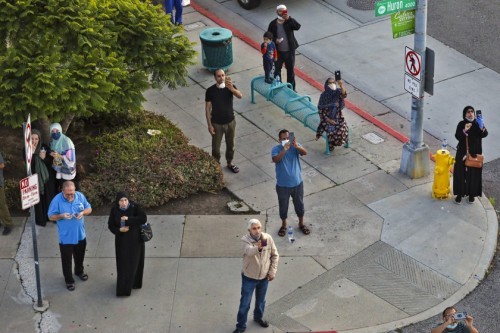
People stop in their tracks to watch Mahmood Nadvi deliver the Islamic call to prayer from the roof of King Fahad Mosque in Culver City. (Irfan Khan / Los Angeles Times)
Which is what made the scene in a Culver City neighborhood, near a gun shop and a church with a sign reading “Jesus Saves,” unusual. Even historic. Like the life-altering pandemic that inspired it from here to Minnesota to New Jersey during Ramadan, the holiest month in the Islamic calendar.
In extraordinary times, when Muslims are unable to break the fast and pray together because COVID-19 has forced mosques to close — as it has some churches and other places of worship — the adhan has brought comfort. Cities across Southern California, including Redlands, Fontana, Rancho Cucamonga and Claremont, have allowed mosques to broadcast the call to prayer publicly.
Outside the Culver City mosque, some pedestrians stopped in their tracks when they first heard the adhan, seemingly surprised. This was something new, and it was not altogether clear how it would be received — as with many things Muslim in the U.S.
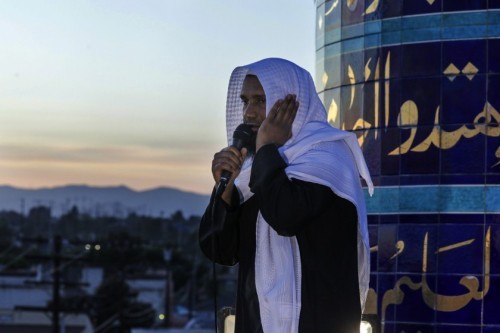
Mahmood Nadvi uses a handheld microphone to share the adhan, the Islamic call to prayer, at King Fahad Mosque in Culver City.(Irfan Khan / Los Angeles Times)
“It is indeed historical,” said Abdullah, who in the last week has heard the call to prayer broadcast in Redlands and Fontana. “It’s more than tolerance, it is our acceptance, I think. That’s a remarkable thing that this country has shown once again.”
But in Culver City, the call to prayer did not go unchallenged for long.
After four days, on May 18, the city’s police department revoked the amplified noise permit, citing people congregating at the mosque in violation of the county health order, as well as “numerous loud noise complaints from area residents.”
“We have had and will continue to have a great relationship with mosque leadership,” said Capt. Jason Sims with the Culver City Police Department. “We are certainly happy to help with facilitating any type of service that is not in violation of county health orders.”
Three days later, the city changed course again, reinstating the permit on the condition that the mosque lower the volume.
Meanwhile, on the Nextdoor social networking app, debates raged between neighbors.
“I’m glad I don’t live near there,” someone commented, spawning a string of responses.
“There are a lot of bitter racists in CC,” someone replied.
“What has a Muslim ever done to you?” one user said.
“Make me unhappy,” another responded.
Another commenter added: “You should ask people from Europe what they think about the muslims? I don’t think you get many people cheering them on.”
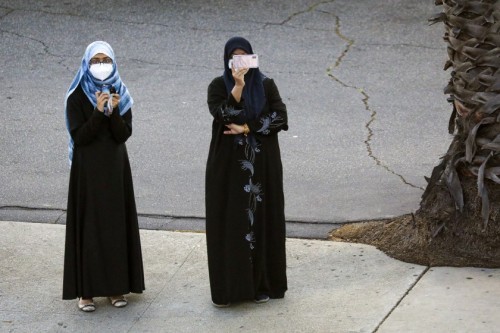
Two women in hijabs and masks gaze up as the adhan, or Islamic call to prayer, floats down from the roof of King Fahad Mosque in Culver City.(Irfan Khan / Los Angeles Times)
Across the U.S., the closure of churches has prompted pushback, with some filing lawsuits and a few defying stay-at-home orders.
The U.S. Justice Department warned in a letter Tuesday that the measures Gov. Gavin Newsom enacted to slow the spread of the coronavirus and his plans to unwind them might discriminate against religious groups and violate their constitutional rights.
More than 1,200 pastors have vowed to hold in-person services on May 31, Pentecost Sunday. On Friday, Trump declared houses of worship “essential” and called on governors to allow their reopening.
In the U.S., the question of whether to broadcast the adhan publicly has been controversial over the years. When the City Council in Hamtramck, Mich., approved the local mosque’s request to amplify the call to prayer in 2004, it sparked anger in the town.
“With so much going on in the world with terrorism, people are afraid maybe they’ll be saying things [in Arabic] that we don’t understand,” a bakery manager said at the time.
Despite the initial controversy, the adhan continues being broadcast there today.
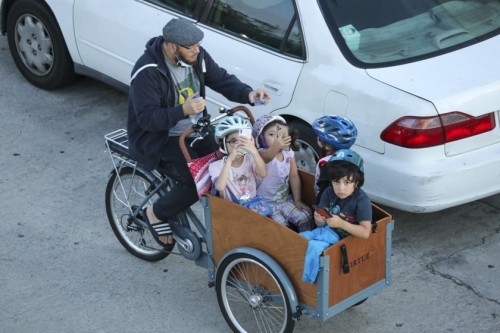
Many mosques across Southern California got permission from local authorities to broadcast the adhan, or call to prayer, which is unusual to hear publicly broadcast in the U.S. Above, a small group gathers outside King Fahad Mosque in Culver City. (Irfan Khan / Los Angeles Times)
In 2015, Duke University called off its plan to sound the prayer call from the chapel’s 210-foot bell tower for the first time, in the face of anti-Islamic tirades on social media and concerns about security.
So this year, when mosques received permits to share the adhan through Ramadan, starting in Minnesota, some worried about what could happen.
“I’m very excited but ... deep inside I also have some concerns. Not because it’s not the right thing to do,” said Hussam Ayloush, executive director of the Los Angeles chapter of the Council on American-Islamic Relations. “But because we also still have people in our country who harbor prejudice towards Muslims or people who are not part of the majority.”
Last week, in Fontana, Ar-Rahman Islamic Center began broadcasting the adhan four times a day — omitting the earliest one around 4:30 a.m.
The only issue the center had, director Juma Darwish said, is that the prayer caller was too loud and actually broke the speaker outside — which the center is working to fix. The mosque has no end date on the broadcast.
“We’re just going to keep doing it until we feel any neighbor has discomfort with it,” Darwish said. “We’re not going to do it if a neighbor complains about it.”
Rauf Patel, director of King Fahad Mosque, and his wife, Anisa, were excited when they heard that the adhan was being publicly broadcast in Minnesota. Anisa convinced her husband to request a permit to do the same in Culver City.
In his letter to the city, Patel said broadcasting the adhan “would be a beacon of light in this trying time.” The mosque has been closed since March.
“During these difficult and unusual times of COVID-19, staying away from the mosque during our holy month has been challenging,” Patel wrote. “Being able to call to prayer out loud ... would not only lift all of our spirits, but also bring back [a] sense of our unity in our community and get us through our last few days of Ramadan.”
Soon after, the Police Department issued the permit. It would last until May 22, the day before the start of Eid al-Fitr, a celebration known as feast of the fast-breaking.
On the first day, May 14, Ahson Syed, the mosque’s religious director, stepped on overturned milk crates and up three steps that allowed him to peer over the roof at the people gathered below.
In Saudi Arabia, Syed was accustomed to hearing the call to prayer five times a day. In the U.S., he typically heard it only inside of mosques or community centers —- certainly not from the rooftops, broadcast across neighborhoods.
That evening, he was the first one to recite the adhan publicly, his voice ringing with emotion over the black loudspeaker. Half of the attendees that night were crying.
On the third night, Suzan Alrayes stood below with her 3- and 5-year-old sons, her husband and her parents. It had been a hard Ramadan, one in which she struggled to explain to her children the lurking, viral danger that prevented them from coming to the mosque.
That Saturday evening, there were plastic containers of dates and water bottles for attendees to take for the breaking of the fast.
The first time Alrayes heard the adhan from the roof of the mosque, she said, “it just gave me goose bumps.”
“I can’t even describe the feeling,” she said. “We’re not used to having the adhan in public in the United States.”
She just hoped, she said, that it wouldn’t disturb the non-Muslim community in any way.
“That would be my only concern,” Alrayes said.
Neighbors living around the mosque were surprised to hear the permit had been revoked, albeit briefly. Many of them said they couldn’t hear it, even though they live nearby.
The mosque, one resident, Liliana Cruz said, is “very much a part of the neighborhood.” She wondered about who would call to complain about the noise, calling them “jerks.”
“I don’t know who those people are,” Cruz said. “I don’t even want to know them.”
Another neighbor, who only gave his name as Eddie, said he wished neighbors had been given a heads-up about the call to prayer. He has stereo equipment, but said he could still hear the adhan from his home, which stands in view of the blue and white minaret.
“If you don’t have anything to avoid it, it can be a form of distress,” he said.
Debra Sugarman, who has lived in the city for 10 years, said she’s spent a lot of time in the Middle East and enjoys hearing the call to prayer. Sugarman, who lives a few blocks from the mosque, said she strained to hear the adhan the first few nights. She wished, she said, that it had been louder.
“It’s Ramadan,” Sugarman said. “They should be allowed to practice their religion.”
4 notes
·
View notes
Text
Persepolis, remember where -we- women used to be
Persepolis
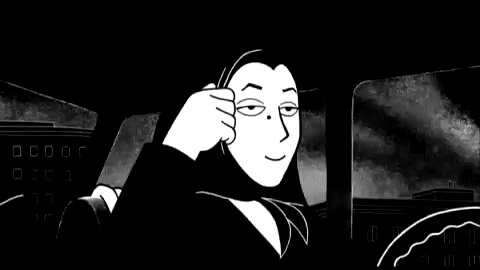
“Since then, this old and great civilization has been discussed mostly in connection with fundamentalism, fanaticism, and terrorism. As an Iranian who has lived more than half of my life in Iran, I know that this image is far from the truth. This is why writing Persepolis was so important to me. I believe that an entire nation should not be judged by the wrongdoings of a few extremists. I also don’t want those Iranians who lost their lives in prisons defending freedom, who died in the war against Iraq, who suffered under various repressive regimes, or who were forced to leave their families and flee their homeland to be forgotten. One can forgive but one should never forget. “ - Marjane Satrapi
This movie admittedly made me cry. What can I say besides I’m a sap for the concept of change and being unable to return to the way it was before. There is a lot that can be sad about this film. There is biting commentary on class and race throughout. Just due to time constraints I really will not be able to discuss it all. So please watch the movie and read the book. It will be worth it. Regardless, In this autobiographical flick we follow Marjane Satrapi through her childhood and early adult years in Iran during and after the Islamic Revolution.
For now skipping straight to post Islamic revolution, Marjane is forced into a much more restrictive societal role. This is obvious visually with the forcing of the hijab on all women. Even those not Islamic or not believing in the tradition is not spared. This is done for the sake of the good men of the country. So they are not distracted by the women’s bodies. This completely ignoring the fact that the men’s fashion of the time was pants so tight you could see their underwear. While fighting with a professor about this same topic Marjane has a bit of a shocking wake up moments where she finally confronts how much bullshit she has been put through. She is proud to be Iranian. It is the country her family has fought and died for. But the country has turned to a bit of a dictatorship. In her class they take the time to have all of the students sit around and cut the Shahs face and name out of their history books. Hoping to erase the past, perhaps have their country forget about it and more easily submit to their wills. As a woman Marjane is now expected to dress ‘virtuous’. This boils down to nothing being visible in public sans hands and face. And Marjane complies. So one would think that she would be a good woman and would be safe from evil sinful eyes. Wrong, of course. For the audacity she has to be seen in public men seen to throw terrible threats at her with no regard. So even playing by the rule’s women cannot win this game. That is because it is not actually about the attire. It is a symbol of an ideology being forced on the women of a country. Women are depicted as taking them off as soon as they get into their apartments. This is also where they are able to speak freely, mostly of revolution.
Marjane does however learn some rules of the society she has been thrusted into and how to play to win. When women threaten her for dressing like a slut, she breaks down in tears in order to avoid their wrath. This is very out of character for Marjane from my perspective. Never before has she been scared to say what she thinks or wants. So she must fall back on these more womanly tactics. Even so. most of the enforcement of this comes from other women in her community. It begins in schools, the female teacher stating something like ‘To cover is virtuous. Veil is freedom. Those who reveal indulge in sin. Veil honors soldiers.’Perhaps using the older women’s internalized sexism or maybe just looking like more trouble than its worth the women move along. As clever as it was problems of gender, race, or sexuality are society and systematic problems not the product of individual interaction. When she appears in a public place to meet with her boyfriend she is generally hassled/ harassed by man also in the park. Cops appear in the vicinity and Marjane knows if she does not act quickly, she will be in trouble for her, well I guess her existence in general. So she quickly whips up some tears and cry sot the cops about how that man made inappropriate and lewd comments about her. So the man is quickly punished and beaten. This public shaming is simply a product of cops general feeling of superiority and need to protect a weak woman. Because otherwise they are weak sinful women. That is not to imply that women somehow have an easier life. It is more that they are just denied certain rights and gain more restrictions. As frantically explained by Grandma Marjane needs to be more careful with cops. If she gets in trouble, she could also wind up worse than just dead. That is because it is illegal to kill a virgin. In order to get around this it is normal for cops to rape women and then execute them. So women are not even protected. It is no wonder her parents wanted her to leave for Paris for a few years. One wrong move could get her locked up like her uncle.
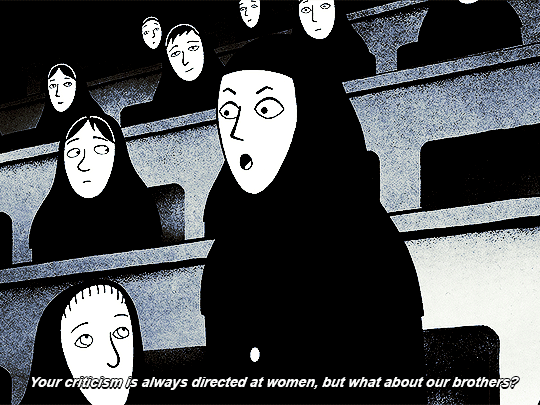
The hypocrisy can also be highlighted later in the film when Marjane is pulled over by cops for running because it makes her butt jiggle. To which she tells then to stop looking at her ass. She is covered head to tow in black cloth. Truly what else is she supposed to do. Government issued orders to suppress female sexuality and freedom is not a trend that has halted even in the modern day. Even in America the land of the free there is a need to claw rights out of the hands of lawmakers holding then back for selfish gain. Humans have this very gross ability to allow things to happen when they view someone or something as lesser than them. Women being lower class citizens makes it okay to talk to them like children or publicly punish them for not wearing their scarf correctly. Because dehumanizing is exactly what that is. They would rather her butt no shake as opposed to her arrive at school in time for her education. Some cops, professors, and men of power refuse to look her in the eye specifically because she is a woman. How can women get anything done if they cannot even enter and equal conversation with a cop. A cop is meant to be a protector but Marjane is in much more danger being anywhere by them.
What is really important abut this movie is Grandma. She is genuinely the coolest. She is quick on her feet, and ready to play the game, or game the system while also being aware of the larger nature of the situation. Grandma can work to help keep her family safe and instill hope in those around her. And the most touching thing is as Marjane grows she gets her grandmothers beauty mark. Grandma passing down her resilience and spirit is possibly what kept Marjane alive in Paris when she was homeless. People are simply a web of interconnected identities and ideologies wearing a skin suit. If all the young men and women can come together in secret speak easies then clearly the government is not representing the true will of its people. Like grandma all one can do to survive is to keep moving forward and keeping hope. She is a demonstration of how a divorcing of concepts like age and religiosity/ fanaticism can help mentor a better next generation. Women need to be free to divorce their husbands, make their own way in the world, and feel able to contribute to the government and community around them. For a girl to grow up is scary, but we do not have to face the revolution in our times alone.
I feel as though i have not done this movie justice. If you have the time please watch through it yourself. All of these issues are beautifully intertwined and are much better enjoyed in their complete context. So please find a copy of this and check it out.
6 notes
·
View notes
Photo
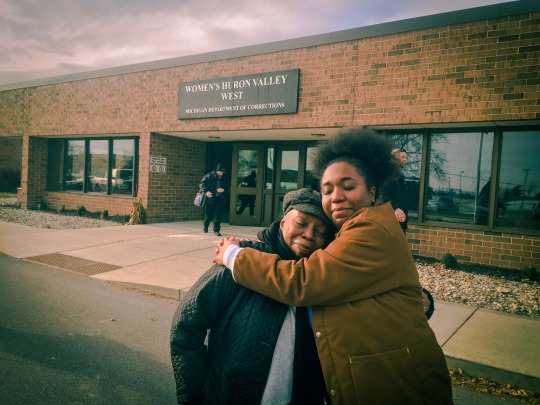
The Love She Waged from a Prison Cell
How environmental justice activist, Siwatu-Salama Ra, dug deep while incarcerated, and the community that lifted her up.
When Siwatu-Salama Ra arrived at the Huron Valley Correctional Facility last year to serve a two-year mandatory sentence, she was in shock, six months pregnant, and not sure how she would live through the ordeal. She spent her first days in an isolation cell staring at the wall. And yet, somehow, through the harrowing nine months that she was there, she advocated for Muslim incarcerated women, organized around birthing and parenting rights for herself and others in the pregnant and postpartum unit of the prison, and convened a poetry group where women inside wrote and shared their deepest selves.
Now, after being released on bond since November 2018 with a GPS tether on her ankle for almost a year, Siwatu’s conviction was reversed on August 20, 2019, and the tether finally removed in late October. Her legal team is urging prosecutors to dismiss the case and not recharge her. Her next hearing is scheduled for November 15, 2019, and the tentative trial date is February 18th, 2020.
The environmental activist has spent much of her life as a community organizer. As a teen, she worked with other youth to tackle environmental concerns affecting their local communities and later became the co-director of the East Michigan Environmental Action Council, where her voice and ability to resonate with people was crucial. She was following the footsteps of her mother, Rhonda Anderson, who has been an environmental justice organizer for the Sierra Club for almost two decades. In her interviews, she expresses how being convicted of felonious assault and felony firearm was not like anything she’d ever experienced in her life or could have been prepared for.
Michigan’s Stand Your Ground
The details of Siwatu’s case were reported by many including dream hampton in Essence, the New Yorker, and Democracy Now! as it became clear that pieces of the case weren’t adding up.
In July 2016, Siwatu was visiting her mother at her Detroit home with her two-year-old daughter when a young girl came by to visit Siwatu’s niece, who also lived in the home. The family became concerned about the presence of the girl as the niece was recently jumped by her at school. They decided it was best she leave. The girl’s mother, Chanell Harvey, arrived to pick her up, infuriated that her child wasn’t welcome.
Siwatu testified that she’d asked Harvey repeatedly to leave the premises. Harvey then drove her car and rammed into Siwatu's parked vehicle, where Siwatu’s two-year-old daughter was playing inside. Then she tried to hit Siwatu's mother—she’d forcefully brought the car within a hair of her. At that point, after taking her daughter inside, Siwatu reached into her car's glove compartment and brandished her licensed, unloaded gun to demand Harvey leave.
Harvey took snapshots of Siwatu, took the pictures to the police, and filed a report that Siwatu had assaulted her and her daughter by pointing a gun at them. Siwatu dropped off her daughter and picked up her husband from work, and arrived hours later to report the incident as an attack on her family by Harvey. One day, after over a month with no response from police, Siwatu’s home was surrounded by police who arrested her because Harvey’s report, in which Siwatu had been named the aggressor, had been on file first.
Of the many controversial details of Siwatu’s case, the most impactful one is the fact that Michigan is a self-defense "stand your ground" state, which gives a legally licensed, law-abiding gun owner the right to use deadly force if they believe it is necessary to prevent death or great harm to themselves or another person.
Siwatu was a licensed gun owner with a concealed carry permit and her gun was unloaded. And Michigan law has consistently interpreted aiming an unloaded gun as non-deadly use of force, according to Wade Fink, one of Siwatu’s attorneys appealing the case. He also states that her case should have hinged on whether Siwatu used reasonable force to meet the threat posed by Harvey, rather than whether or not she feared for her life.
Another issue, Fink points out, is that at the time of the event Harvey was on probation for assault; it was her third felony, and violating probation would have gotten her into trouble. Fink contends this could've been a valid motive for lying. But the defense wasn’t allowed to pursue this line of questioning.
A YES! article that details the rise in Black gun ownership despite the racist origin of the second amendment, explores the perspective of Black gun groups who view the right to self-arm as basic for self-defense in a climate of constant violence. Yet, we also see where laws like Stand Your Ground don’t always work out positively for people of color, as we saw with Trayvon Martin and Marissa Alexander.
As reported by Vox, the Urban Institute found that Stand Your Ground laws seem to worsen racial disparities. When the shooter is Black and the victim is white, only 3 percent of deaths are ruled as justifiable versus the 34 percent when the shooter is white and the victim is Black. “Even when black shooters kill black people,” the article states, “those shootings are less likely to be deemed justifiable in a court of law than those involving white shooters who kill white people.”
The dominant, false narrative that Black people are intrinsically violent obscures genuine issues of equity. It’s why we can have a criminal justice system that operates on implicit biases, even when all persons concerned are Black.
Siwatu’s jury had to ultimately decide, based on Michigan self-defense law, whether Siwatu was truly afraid in that moment to warrant invoking self-defense. Despite the question as to why a woman whose daughter and mother are being endangered by a vehicle would not be afraid and feel a basic human need to protect, the jury ruled guilty because they didn’t believe Siwatu could be afraid, only angry. And the felony firearm charge, which means that a firearm was used in an assault, came with a two-year mandatory minimum.
The power of a community
As she details in conversation with adrienne maree brown on The Practice of Freedom: A Conversation with Siwatu-Salama Ra and Rhonda Anderson on the How to Survive the End of the World podcast, when Siwatu learned that she was having charges brought against her for, essentially, acting within what she believed were her rights to defend her family, she couldn’t wrap her mind around how to continue. But then community showed up.
Siwatu was showered with love. Fellow activists, co-workers, and friends poured in. They showed up at her house asking what they could do to help. There were so many people coming to meetings that were organized on her behalf that they moved gatherings to the larger home of a friend.
At one point in The Practice of Freedom, Siwatu's mom remarks that what was truly notable was how many of the people that came to support were women with children.
They formed the Siwatu Freedom Team and have not only accompanied Siwatu on her journey for full freedom and justice, but also collaborated with a broad coalition on several campaigns including: developing a set of bills to fight for the rights of incarcerated pregnant and postpartum mothers, parents, and caregivers in Michigan; working to end the felony firearm mandatory sentences that disproportionately criminalize Black people in Michigan; and continuing to support and work in solidarity with women Siwatu met inside prison as they return home.
Finding a way through madness
From the moment that charges were brought against Siwatu—through her court case and eventual sentencing, right up to her release and the reversal of her conviction, and now as her legal team works to put this case to rest completely —countless people have poured enormous dedication towards supporting her, spreading the word about her case, raising legal funds, writing letters, and organizing meetings. In prison, however, she was alone, facing close walls and prison bars. The letters that poured in from community across the country were like beacons of light in the darkness.
In the isolation of her experience, she stumbled across a book called Deep and Simple, by Bo Lozoff, who had co-founded the Prison-Ashram Project and worked for 20 years guiding people behind bars to reach their own inner peace. “He was able to steer men and women who were inside of a prison to that oneness,” Siwatu says in The Practice of Freedom. “My community, Bo, my mom, literally saved my life in prison.”
“I remember reading this book and being just so blown away...it was answering the questions I had, the why me, the what do you want, what am I supposed to do?” Then one day she noticed a copy of Deep and Simple on her pregnancy counselor’s office desk; the counselor offered her all the Bo Lozoff books she had in her office.
Siwatu reflects that in prison, a person is stripped of everything and anything that could offer them comfort. Reading Bo Lozoff helped her reach a place of peace inside herself despite the deep sadness all around her. “If anybody walks out of a prison...who is enlightened,” she says, “it is the work of themselves, and it is despite of the prison. Bo helped me take advantage of that hell.”
She also witnessed the spirit of fellow inmates around her. They inspired her. She said in a recent interview with Earth First! “You normally see women on the frontlines fighting, and you saw the very same thing inside the prison: women fighting to hold on to some of their dignity and humanity to say, ‘This is not how we will live.’”
She says there were women working on so many issues—from trying to get treatment for the yellow water coming out of prison pipes to making sure the food on their plates was sanitary.
When Siwatu learned that her challenge getting a hijab, a Quran, and the meals she required for the daily practice of her faith was not her challenge she faced alone, she led other Muslim women prisoners in organizing for religious rights that legally should have been accommodated by the facility. Her efforts attracted attention from the Council on American-Islamic Relations in Michigan, which filed civil rights complaints on a number of the prison’s practices regarding religious freedom.
Disheartened by the ways in which life behind bars was designed to cut down a person’s humanity, Siwatu also created a poetry group and fostered close bonds with the women around her as they co-created a space of beauty, where poetry offered gateways to emotional freedom.
Finally, her harrowing experiences of pregnancy and birth in prison led her to inform herself of her rights as a parent and mother, which she then shared with other prisoners. At the time of Siwatu’s delivery, the Michigan Department of Corrections did not allow loved ones to be present at labor or delivery although Siwatu’s family, community, and other activists and organizations made every effort to get the MDOC to humanely shift its position.
In early October 2019, as a direct result of this organizing, the Michigan’s House Appropriations Subcommittee on Corrections added new language to the budget bill that states that anyone in prison due to give birth in prison can consent to one visitor being present during labor and delivery. The language states that person must be an “immediate family member, legal guardian, spouse, or domestic partner.” It’s a signal that change is happening.
A more humane and discerning system of justice
For every person that is able to have a protest, or national news attention, or a community of devoted people call out that a wrong be brought to light, there are hundreds more sitting in a jail cell without any of these options.
Siwatu, speaking to Earth First!, said that knowing she was innocent only made it easier for her to see how many more women were likely in prison unjustly.
“...You have a large population of women who will be returning citizens who have literally been face to face with the very beast we’re fighting,” she said. “They are walking out of that prison cell, out of custody, with much knowledge, so resilient, and so beautiful. I encourage that everybody support women and men coming out of these prisons because they have seen so much. They know what it will take to win this.”
When asked how being incarcerated changed her perspective on environmental issues, she explained how it strengthened her belief in looking at how different issues are connected.
“It took me to literally be taken away from my family and taken away from my children and placed in a prison cell to understand we have to step away from... self-identified work and dedicate our entire selves to a better world.”
“You have to look at everything,” she said, “and take everything into consideration of how all these injustices are interconnected and feeding off one another.”
And then what could justice look like? Life-valuing structures that value healing more than they value practices that dehumanize, and where deeper understandings of history and social problems are incorporated, so that there are sustainable options for actual accountability, wellness, and growth in communities.
Showing up to speak, listen, learn, share, and organize wherever and whenever possible is essential for this shift to take place. We can learn from and build upon cases and experiences like Siwatu’s.
ACTIONS:
Support Siwatu’s legal fees as her hearing approaches on November 15, 2019, help sustain her family throughout this arduous process, or support continued organizing Siwatu’s freedom and policy changes, by donating here.
Go to FreeSiwatu.org to learn more, stay posted, and find more ways to get involved.
Host a house party or community gathering to share Siwatu's story, have discussions, process the impact of this and similar stories, and brainstorm organizing ideas.
Get involved with local groups in your area fighting for prison abolition, environmental justice, and supporting people directly impacted by the prison and criminalization industrial complex who are working for liberation.
11 notes
·
View notes
Text
Peppermint
The dark streets aren't a place for anyone or anything at night, that is... except for the ones who have no place within the light to begin with.
I and the others I am meeting are the exception.
I waltz down the carriage lanes of this old sleepy town in my favorite dark jeans and a black knitted sweater, a forest green cloak draped over me with the hood down, catching wisps of dark figures in the corners of my eyes. These creatures are not quite of this world, nor is the figure, visible only by the translucent outlines of white waltzing along with me tonight. The common folk need not fear these creatures, unless you know they exist they are impartial. Then even if you do, leaving out some seeds and honey as an offering will keep you from harm, give them blueberry tea if you want some good luck.
Tonight I climb the hill just beyond the old yew tree the fae adore and that everyone refuses to cut down least they fear a despicable end. No one besides me and a few others dare to climb it at night, they say strange things happen there, dark figures prowling about almost like regular animals, yet their limbs too long and narly. When climbing you’ll get an ice chill down your spine, a sinking feeling in your gut and the one clear thought you can manage out is something along the lines of: I should not be here.
The way I and the other I am meeting ward this off is by leaving generous offerings before we ascend. I find McDonald's fries generally please them, so arriving at the foot I leave four extra large fries and a pack of chicken nuggets, right beside my coven’s other offerings. I can see no figures awaiting me from where I stand, a bad sign usually but I start up the hill against my better judgment.
Reaching the top, my calves are burning, the trek never gets easier. I lean down to massage my right calf, my dyed red hair falling around me and pale skin a sharp contrast in the full moon’s light. As my hood falls over my eyes I spot two figures lying on the ground, one covered with a light blue cloak, dark tightly braided hair and face peeking out, the other a maroon cloak and a hot pink dress.
I address the girl with the maroon cloak first “You hiked this thing in heels? What are you? Cat woman girl?” I ask rummaging through my bag for my supplies.
Bonita laughs “You wish hun, got your supplies?” she says sitting up elbowing Makena.
I nod, both of them standing and whipping out their supplies from their own bags.
We start to set up the temporary alter as Makena speaks, getting our attention “Bonita, Roxy-” she hesitates on her next words, half way done her particular task to set up “This might be the last time we pray and do a spell together, you know, with all of us off to college in a few weeks,” she says, her voice wavering a bit while fiddling with her long curly hair.
Bonita’s eyebrows shoot up and she makes a face before chuckling “If you’re implying that we’re gonna grow apart sweetie while we’re in college you better evaluate dear Roxy’s OCD level schedule of communication and visits,”
Makena blushes and shrinks but laughs with us at my expense.
We make short work of setting up the rest of the altar and preparing to pray.
Tonight I’m going to pray to Sarasvati for help forming and performing my Valedictorian speech, something I desperately need. I’ve been rewriting it for a week now and still haven’t made any headway. I also need to pray to my main hoe Soma to make Grad amazing and Dhat to bless the spell we’re about to do. I’m not sure what Bonita and Makena pray about, or who to, guess I never really asked. Regardless we each get into our preferred positions and pray to whichever gods and goddesses we choose about whichever we want.
The graduation ceremony took place in pitch black, the sun already set, small shifts of movement coming from the rows of seats and the rafters, family and supporters brought together alive and passed, human and not. The only light coming from the spotlights on the stage as Principle Chiba gave an inspirational and touching speech that moved everyone here. Applause began and continued as I replaced Mr. Chiba at the podium, soon it died down and I spoke a silent prayer I would do well before I began.
“Fellow classmates, graduates of 2018, I will not bore you with a lengthy speech going on about things that don’t matter, we all have better things to do. Instead I will give you some words of advice given to me by someone I miss dearly, who has gone on to University in a very far away place yet I remain close to. That advice is to simply, remember to call. Call to say how beautiful the leaves are on the trees outside your dorm window. Call to ask how they’re doing. Call to just say I miss you. Call to make them open their bedroom window because they’re home for the Holidays and you’re outside freezing, 20 ft up in the air on a tree and regretting every life choice you’ve made up to that point. So call, it keeps you close to those you care about. Thank you.”
I don’t think we called enough.
Sitting here, awkwardly in this cafe we used to come to in high school when conversation just flowed, I wonder what went wrong. I know we didn’t follow the schedule, school and life got in the way, but… that shouldn’t stop us from reconnecting.
“So, any special someone in your guys lives?” I ask, a small forced and nervous smile on display as I grasp my mug.
My sister Sofia shoots me a sarcastic thumbs up. I’m tempted to flip her off.
Bonita nods “Their name’s Avery, they’re pretty nice,” she says looking down into her mug.
“I’m not seeing anyone right now actually,” Makena says, taking a bite of her pastry.
I nod my head, this is not going well “That’s nice,” I take a sip from my mug, racking my brain to come up with something to start a decent conversation.
Makena pretends to get a text and looks at her phone “Sorry guys, it’s been fun but my mom wants me home to make sugar cookies, see you later!” she says practically sprinting from the table.
I know she was pretending because she always has her ringer on, in high school it used to get her into so much trouble.
I remember when it went off in the middle of a lock down drill, school took it away for three days, and like any teenagers would we concocted elaborate schemes to get her phone back. None of them worked of course, including the one where Bonita tried to tell the receptionist she was Makena was mom, but we had fun nonetheless.
“I should actually go too, I got some stuff that I need to attend to,” Bonita says laughing half halfheartedly.
I nod and watch her awkwardly leave. Letting out a defeated sigh I let my head fall into my arms. Why was talking to them after a year so hard?
“You ok?” my sister asks, sitting down across from me.
The phase sent me over the edge, tears started spilling into my cardigan then running down my cheeks as I lifted my head. Unable to speak, I shake my head.
She grabs a tissue from her bag and hands it to me “You know you could always try doing something you guys used to do back in high school together,” she suggests sipping her drink.
I sniffled “I don’t know, I noticed Bonita wearing a cross and Makena started wearing a hijab,” I used the tissue to wipe away the tears “They’ve changed a lot…”
My sister nods “Sorry I’m not more help…”
“It’s ok, they’re allowed to change it’s just I didn’t expect them to so much,” I say, my phone starting to vibrate.
It’s Vincent, one of my new friends from Uni, I answer it “Hey tic tac, whatcha need?”
He laughs “Nothing, just want to know how the old reunion is going,”
“Not well, but I know that’s not why you’re calling, what did you do this time?”
“Can’t a friend bug another friend anymore? And besides it’s not me, it’s your roommate, apparently she accidentally turned your sheets orange when washing them,”
I chuckle, and rub my face “How bad is it?”
“Bad, very bad, looks like leftover prison suit material was used, then bleached in some places,”
I laugh genuinely “I’ll be sure to pick up new ones when I get back then,”
“Good, those sheets have seen better days. What’s up with your friends? Thought you were really excited to see them,”
“Well, I was, but… they’ve changed a lot. They’re not the people I used to know back in high school and I don’t know how to reconnect with them,”
Vincent sighs “You’re not gonna like what I have to say about this but you need to hear it,-” he pauses and I scrunch up my face. What could he possibly have to say that I wouldn’t like? “-Sometimes, through no fault of anyone involved, relationships just… don’t last,”
I blank for a second, shocked he’d even say something like that. “What the hell? What am I-”
“You didn’t let me finish!” he interrupts his voice weakly raising an octave. I huff but let him continue“Sometimes they don’t last because people just change too much, and that’s no one fault, people need to change so they can grow. And sometimes that means you change so much people lose connection because there’s nothing to connect with. That doesn’t make sense, umm, ok, take two people at the start of a relationship. They both love to… drink coffee so every day they go out to drink coffee,”
I chuckle a little raising an eyebrow “Coffee? That’s the best you can come up with?”
He shushes me playfully “Anyways, so a little later in this friendship one decides to give up coffee due to Insert Reason Here and they stop hanging out as often. Since their entire relationship is based on coffee and now that’s been taken away, they don’t have anything in common. They drift apart and remember each other as a good friend they had,”
I nod and ponder what he said “So… people can just drift apart? In that situation aren’t you supposed to try to make new common interests?”
“Yah, but sometimes that just doesn’t happen for whatever reason and that’s where my wisdom comes in!” I can feel his overblown and ridiculously camera smile of annoyance from the other side of the country.
“I’m throwing a pillow at you when I get back,” I say going to hang up, his laughter ringing out.
My sister’s nowhere to be seen, probably went to the washroom. I remain sitting, my drink all gone and the sun dipping down to paint everything a nice shade of orange.
I wonder if Vincent had a point. I had tried to reconnect with my friends, but they just… were too changed from when I knew them… I could keep trying, but how many times would I sit through awkward conversations that lead nowhere before we reconnected or they started making up excuses not to come?
I sigh out loud and play with my empty cup. Why do people and relationships have to be so difficult?
I realize Vincent’s right… Why for the love of the gods does Vincent have to be right this one time?
Sighing again I begrudgingly move up my flight up to this Thursday, two days from now. My parents moved after I graduated high school and my sister was seeing her friends so it wasn’t like it was an inconvenience to anyone.
My sister reappears and sits down “Sorry, didn’t want to interrupt your phone call, had to go to the washroom,”
“That’s ok, I was just about to leave, -” I stand up and hesitate to continue “-I also moved up my flight to this Thursday…”
“You sure? Shouldn’t you try to reconnect a little harder?” she asks, walking with me to the door.
I sigh “Yes, sometimes people just grow apart and despite their best efforts they just don’t recover,” I mentally kick myself for quoting Vincent, the jerk would never let me live it down. I grab a peppermint from the little bowl as we exit and pop it in my mouth.
“Sounds like you’ve made up your mind.” she comments getting in her rental car “Want me to drive you to the airport?”
“Sure, I’d like that,” I say with a sad smile.
Watching her drive off and getting into my car, I feel my heart droop, finally realizing that was the last time I’d probably see my old friends again but, I also feel like a sense of dread has been scrubbed off of me.
4 notes
·
View notes
Text
SKAM Austin Season 2 Episode 7 Thoughts
This episode was extremely hard to watch. Sexual assault is an incredibly heavy storyline, but I think SKAM Austin has done an incredible job so far in telling Grace’s story. That being said, I found some parts very difficult to watch and I had to steel myself to get through all the clips this week. As a young woman, this storyline resonates very deeply with me. I have been lucky enough to avoid a lot of sexist comments or misogynistic cat-calls, but especially now, with the whole #MeToo movement bringing to light so many awful instances of sexual harassment, it just makes me so wary. I think Grace’s story is an important one, and I think it is a really necessary one to tell in this day and age.
Up Early
Oh, boy. This is going to be rough. Grace wakes up and immediately knows something is wrong. She finds herself lying in bed naked next to Clay and another random girl.
This scene was shot very well. I felt Grace’s panic as she put her clothes on and hurried out of the house. I felt her anxiety as she impatiently waited for her ride to come. Also, a nice American touch for Grace to have called some driving service. All the other remakes have just walked home.
No matter how many times I watch this storyline, I don’t know if I will ever come to a point where I am unaffected by it. To their credit, I think all of the remakes so far have done a superb job handling the sexual assault storyline (except for William’s reaction to it, obviously).
I have to say, the little things Grace murmured to herself throughout the clip just broke my heart. She was trying so hard to convince herself that she could keep it together.
Oh, no. She gets all the messages from Daniel about how much he loves her. That must be a punch in the gut.
And then she throws up almost as soon as she gets in the car.
I read some comments on the website and was shocked to see how many people were victim-blaming Grace. It disgusted me. What happened to Grace was in no way her fault. Victims of sexual assault already suffer enough from guilt about those events and often times don’t come forward exactly because of reactions like the ones I saw in the comments.
Cocoon
Grace feverishly scrubs her body in the shower as if to wipe off any trace of Clay’s touch from her.
She then huddles in her bed, hugging her knees to her chest, the aforementioned cocoon. I saw a beautiful comment about how this whole experience for her is like a caterpillars journey into becoming a butterfly. I just need Grace to become a butterfly.
Go Away
Well, Eve is kind of annoying at first in this scene. Just bustling in the door and touching and grabbing things.
Oh, god. Of course Grace wants to get rid of that god awful shirt. She thinks she
I do appreciate the fact that Eve left right away when Grace asked her to. That was considerate of her.
And Grace returns to her cocoon and then proceeds to take another shower.
What’s Going On?
A loud party is going on outside Grace’s room while she is trying to research if she had sex or not. Fuck, why is this party going on?
I find it sickening that Grace is forced to communicate with her possible assaulter in order to find out what happened that night. She should not have to go through with that after everything that happened to her. Her agonizing over whether or not to send the message with the smiley face emoji was surprisingly poignant. Hoping he opens up to her, but trying not to appear too friendly nor wanting to appear too friendly.
Finally, Grace goes out to shut that party down… and what the heck is going on in that house?
I mean, I know the Bunny Vampire (?) party is an annual tradition, but Eve should have still asked Grace if it was OK given that they do share the house.
Did Eve really call Grace a bitch? Eve. I am disappointed.
OK, I know that Grace is pushing everyone away and I did appreciate that Eve said she was there for Grace no matter what, but her whole speech sounded so forced. I mean she literally just called Grace a bitch, for god’s sake. It is hard to sound sincere about being there for a person right after saying that to them.
Ugh, the texts from Daniel are just a punch to the gut for Grace.
I found it interesting that they broke the fourth wall with Grace staring straight at the camera.
All I Get
Oh, OK. So it is an essay project that Grace has to write this time around. I find that kind of weird because they did so much to set Grace up as a journalist this season that I just assumed they would take the same route as OG. I guess it doesn’t really matter either way.
Grace looked so uncomfortable with Daniel’s physical contact. I am not surprised.
She pushes Daniel away because she thinks she slept with his brother. Daniel must be so confused right now and I don’t blame him. Of course, I don’t blame Grace either. She feels like she has no choice in this situation and she doesn’t want to hurt Daniel.
Feel Like Me
Grace stalking Clay again - this time on Facebook. God, I feel so bad for her. Tell the girls, please.
Kelsey comes in as a ball of energy, ready to get Zoya onto Prom court. I am interested to see more of this new Kelsey who no longer has to constantly worry about Daniel.
Zoya seems ready to drop the whole Prom thing after the “terrorist” incident. All the girls look super awkward when she brings it up. Did they never discuss it with Zoya?
“Zoya, whoever did that to your locker is obviously going to hell.” Wow. Kelsey’s Christian upbringing is not brought up often, but it’s lines like these, ones that pack such a punch, that makes me wish SKAM Austin delved into this part of Kelsey’s character more.
Aw, and that little line of “You’re the prettiest one out of all of us,” to Zoya was so cute. You can tell it is a compliment of the highest regard coming from Kelsey. I am really loving this Kelsey.
I was kind of worried where they were going when Kelsey asked why Zoya wore her hijab, but SKAM Austin did not disappoint. Zoya wears her hijab because it makes her feel more herself and despite all the hate that it attracts, she still loves wearing it. That was a beautiful statement and I loved Kelsey’s response to it, wanting to be as brave as Zoya. #ImWithZOYA.
And then the girls ask Grace what she thinks and she has to muster up this half smile to agree with them. I feel for her so much.
Worried
Grace is mulling over what to write for the essay competition when Marlon comes up to her.
Well, this Marlon situation is very complicated. I do think Grace was rather harsh on him, but it is understandable; she is projecting her feelings about her sexual assault on Marlon.
I know people were debating about whether it was wrong what Marlon did, starting to hook up with Megan and then stopping. I agree that it is good that he stopped once he realized how drunk she was, but the fact remains that he should have never tried to hook up with her in the first place. They are broken up, he obviously doesn’t have feelings for her, but she does and hooking up with her, even just starting to hook up with her, can seriously mess with her. Megan needs to have closure with this relationship or else she will never get over Marlon. I do think he was right in saying it wasn’t his place to take care of her; that goes along with him not involving himself with her. Just stay away from her, Marlon. Please.
Then Grace gets the text from Clay saying nothing happened at the party. Oh, she looked so happy for a second. The relieved smile on her face made my day brighter. Unfortunately, it all had to be ruined.
Grace goes to Daniel and they reunite. OMG, it seemed like Grace might tell Daniel what happened with Clay!
But then he cuts her off to explain himself. Notable difference in this scene is that he does not say his brother is a psychopath. Well, that’ll come later… Instead he goes on to say that he can’t promise not to get into another fight. Hmm, not a great make-up speech, Daniel. Oh, he says if anyone ever tried to hurt Grace, he would kill them. They proceed to passionately make-out. WHAT?????? OK, if someone said that to me, I would be majorly freaked out. I don’t anyone to kill someone on my behalf, or revenge my death or anything like that. Not even my dad. That kind of thing just makes me feel uncomfortable and frightened. I don’t get why someone (Grace, cough, cough) would be turned on by that.
Daniel leaves, Grace gets that dreaded text. The text where Clay sends a naked photo of her (majorly creepy, dude) and tells her how crazy she was at the party. Grace looks horrified.
General Thoughts
Well, I thought this episode was one of the best this season. So far, SKAM Austin has been nailing it with these scenes about the aftermath of a sexual assault. They included links to an organization, RAINN, that helps sexual assault victims. I appreciated that. A lot. So, I guess we have two more episodes in the season, not one. Thank goodness because it would be very hectic trying to cram everything into only one more episode. Grace still hasn’t told the girls or Eve anything. I hope next episode she finds the courage in herself to confide in them. They will not judge her, and they will support her, no matter what.
21 notes
·
View notes
Quote
While you're still horrified by the mosque shooting, I'm going to share something I don't normally share. Because tomorrow, it won't be so fresh, and that feeling you have right now, where even a small, kindhearted country like NZ isn't safe won't be filling your heart the way it is right now. That feeling? That fear? That is the feeling that many of us feel every time we set foot in a Mosque. I used to attend one of the larger Mosques in San Diego. It was beautiful and was one of the few places I felt at peace. I took my young niece every week, and she couldn't wait for us to don our hijabs and drive to the Mosque for Friday services, community, and a meal many of us would share together. Then the hate started. I won't share everything that happened, but one day, someone duct taped firecrackers two the underside of several cars while we all prayed. Luckily, they didn't cause the cars to explode, but it changed everything. More things happened, forcing us to hire security guards around the clock to keep us safe. Things began to happen to me outside the Mosque, and one day, someone saw me driving with my hijab on and ran me off the road with a toddler in the backseat. I realized that exercising my freedom of religion and practicing a religion I had practiced in rural KY without issue was putting my family in danger. I stopped wearing hijab and I started parking really far from the Mosque and walking down the winding streets, stopping to cover my head just before I entered because I was so scared. Not for myself, but for my family. As time went on, things only got worse, and there came a point where I couldn't listen to the Khutbah any longer without watching the door, and wondering if today was going to be the day that they would stop trying to get us in our cars and attack us when we were sitting ducks. I moved to Texas, and the haters were even more vocal here. My middle child came home crying because the World Cultures teacher told the class that all Muslims were terrorists no matter what we said to try to hide who we were. My children were bullied for who I was, and I withdrew even more. Then the shootings and the fires started. Nowhere was safe. Not school, not houses of worship, not my own car. It took a while to find a Mosque here. They're not as bold here, tucked away in small communities. I have been to the Mosque here. It is beautiful, and the people are friendly. But every time I step foot in the Mosque, my anxiety skyrockets and I feel like I'm going to die. I've been in two active shooter situations in my life. I have been spit on, shoved and cursed out. And once, a man with a gun on his hip turned to me and said something that made my blood run cold because in his mind, he was the good guy with the gun, despite his t-shirt that clearly proclaimed to "shoot 'em all, and let God decide" with the dead bodies obvious Muslims. Nowhere is safe. And this feeling that you have right now, this is how some of us feel every time we leave our homes. Because every Friday prayer could be our last. Today, families went into Mosques in NZ, ready to sit with loved ones and pray and they were slaughtered. The current climate allowed this. This isn't about some unhinged loner in his parents' basement. When Islamaphobia is normalized, this could be anyone. Because people are afraid to stand up, or if it doesn't affect them, maybe they "mind their own business". Anytime you hear Islamaphobic remarks (and antisemitic remarks because Jewish Americans are not safe, in this climate, either) and you say nothing, you are letting them know that their words mean nothing. You cannot be an ally if you shy away from confrontation. When your family members and friends joke about stereotypes and you avoid conflict, you feed the beast. We need you all to speak out. We can't be the only ones to stand up to the hate. This is the time when allies make a marked difference. We need you to stand up. To say that there is no such thing as a harmless joke or a funny stereotype. Don't say that your father/brother/ grandmother/boss didn't mean "regular Muslims". You can't just let this stuff go, because it grows and it builds up until there is nowhere safe for anyone to worship. Or live. Or breathe. My daughter deserves a world where my heart doesn't skip a beat every time she comes out of school wearing a hijab she snuck in her backpack. On holidays when the kids can come to Khutbah, I shouldn't wonder if "Thanksgiving Massacre at [name] Mosque" is going to be the next headline. To be forgotten a week later. This is our daily life. When the headline is replaced with another tragedy & memories of today fade, we will still be in danger in our homes, spit on, yelled out, our Mosques burned, vandalized, and our women unsafe because of a piece of cloth. Don't just speak up today. Don't think a hashtag dedicated to the victims makes you an ally. Speaking up anytime you see something, boycotting celebrities who spread antisemitism & Islamaphobia, & educating your family is how you show your 'allyship'. We need you. Your voice matters. Please, speak up and don't stop until this world is safe for us all.
Vianna Goodwin, Twitter
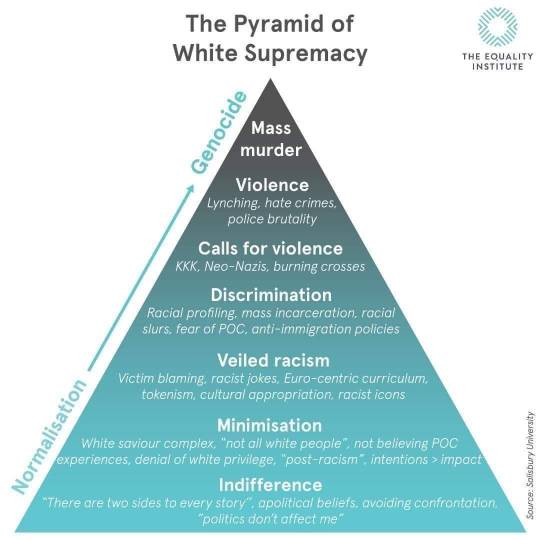
13 notes
·
View notes
Text
I post things that are well-said because I admire language that reaches in, clasps your heart, and either massages it...or crushes it.
Today...this is heart-crushing, heart-wrenching.
I am going to post Vianna’s thread in essay form, because the impact of her words, of her daily experience, should not be broken up by character limits.
This message has the right to impact us all.
https://twitter.com/GoodwinVianna/status/1106412865408385024
While you're still horrified by the mosque shooting, I'm going to share something I don't normally share. Because tomorrow, it won't be so fresh, and that feeling you have right now, where even a small, kindhearted country like NZ isn't safe won't be filling your heart the way it is right now.
That feeling? That fear? That is the feeling that many of us feel every time we set foot in a Mosque. I used to attend one of the larger Mosques in San Diego. It was beautiful and was one of the few places I felt at peace. I took my young niece every week, and she couldn't wait for us to don our hijabs and drive to the Mosque for Friday services, community, and a meal many of us would share together.
Then the hate started. I won't share everything that happened, but one day, someone duct taped firecrackers two the underside of several cars while we all prayed. Luckily, they didn't cause the cars to explode, but it changed everything. More things happened, forcing us to hire security guards around the clock to keep us safe. Things began to happen to me outside the Mosque, and One day, someone saw me driving with my hijab on and ran me off the road with a toddler in the backseat. I realized that exercising my freedom of religion and practicing a religion I had practiced in rural KY without issue was putting my family in danger.
I stopped wearing hijab and I started parking really far from the Mosque and walking down the winding streets, stopping to cover my head just before I entered because I was so scared. Not for myself, but for my family. As time went on, things only got worse, and there came a point where I couldn't listen to the Khutbah any longer without watching the door, and wondering if today was going to be the day that they would stop trying to get us in our cars and attack us when we were sitting ducks.
I moved to Texas, and the haters were even more vocal here. My middle child came home crying because the World Cultures teacher told the class that all Muslims were terrorists no matter what we said to try to hide who we were. My children were bullied for who I was, and I withdrew even more. Then the shootings and the fires started. Nowhere was safe. Not school, not houses of worship, not my own car.
It took a while to find a Mosque here. They're not as bold here, tucked away in small communities. I have been to the Mosque here. It is beautiful, and the people are friendly. But every time I step foot In the Mosque, my anxiety skyrockets and I feel like I'm going to die.
I've been in two active shooter situations in my life. I have been spit on, shoved and cursed out. And once, a man with a gun on his hip turned to me and said something that made my blood run cold. Because in his mind, he was the good guy with the gun, despite his t-shirt that clearly proclaimed to "shoot 'em all, and let G-d decide" with the dead bodies obvious Muslims. Nowhere is safe.
And this feeling that you have right now, this is how some of us feel every time we leave our homes. Because every Friday prayer could be our last. Today, families went into Mosques in NZ, ready to sit with loved ones and pray and they were slaughtered. The current climate allowed this.
This isn't about some unhinged loner in his parents' basement. When Islamaphobia is normalized, this could be anyone. Because people are afraid to stand up, or if it doesn't affect them, maybe they "mind their own business". Anytime you hear Islamaphobic remarks (and antisemitic remarks because Jewish Americans are not safe, in this climate, either) and you say nothing, you are letting them know that their words mean nothing. You cannot be an ally if you shy away from confrontation. When your family members and friends joke about stereotypes and you avoid conflict, you feed the beast.
We need you all to speak out. We can't be the only ones to stand up to the hate. This is the time when allies make a marked difference. We need you to stand up. To say that there is no such thing as a harmless joke or a funny stereotype. Don't say that your father/brother/ grandmother/boss didn't mean "regular Muslims". You can't just let this stuff go, because it grows and it builds up until there is nowhere safe for anyone to worship. Or live. Or breathe.
My daughter deserves a world where my heart doesn't skip a beat every time she comes out of school wearing a hijab she snuck in her backpack. On holidays when the kids can come to Khutbah, I shouldn't wonder if "Thanksgiving Massacre at [name] Mosque" is going to be the next headline. To be forgotten a week later.
This is our daily life.
When the headline Is replaced with another tragedy & memories of today fade, we will still be in danger in our homes, spit on, yelled out, our Mosques burned, vandalized, and our women unsafe because of a piece of cloth.
Don't just speak up today.
Don't think a hashtag dedicated to the victims makes you an ally.
Speaking up anytime you see something, boycotting celebrities who spread antisemitism & Islamaphobia, & educating your family is how you show your allyship.
We need you.
Your voice matters.
Please, speak up and don't stop until this world is safe for us all.
...~twitter@goodwinvianna
11 notes
·
View notes
Text
Engel and “Nice White Lady” Racism
“The most effective adaptation of racism over time,” DiAngelo claims, “is the idea that racism is conscious bias held by mean people.” This “good/bad binary,” positing a world of evil racists and compassionate non-racists, is itself a racist construct, eliding systemic injustice and imbuing racism with such shattering moral meaning that white people, especially progressives, cannot bear to face their collusion in it.
- A Sociologist Examines the “White Fragility” That Prevents White Americans from Confronting Racism [X]
I’ll be the first to admit: I like Engel. She’s quickly become my favorite Vilde for a number of reasons. She seems kinder, more open to admitting her mistakes, and more aware of her own discomfort. Above all, she’s not openly hostile to Imaan and it seems like she’s really trying to make Imaan feel included. It seems like a lot of the fandom agrees.
Something that the fandom also seems to agree on is how rude Imaan is. “Why is she so mean?” is a question, in many different forms, that keeps popping up. And the consensus behind this seems to be that her actions and words are mostly unwarranted. Ad that’s because Engel is sweet and kind and even when she messes up, she apologizes. So it’s not like with Kiki (Druck) or even Vilde (og Skam). In short... a lot of folks seem to agree that Imaan is being mean for no reason.
But I think it’s important that we investigate this a little further.
Because to Imaan... it probably doesn’t seem like “no reason.” And to me, and maybe some other Muslim fans and/or fans of color watching, it doesn’t feel like no reason at all. In fact, much of it seems warranted. And what really feels mean is that I can’t seem to escape the same old defenses of white women/white womanhood that have oppressed WoC for centuries. I'm tired of being forced to see things from white women’s point of view. And I’m tired of WoC being condemned for their anger.
Because regardless of how sweet or well-intentioned Engel seems to be, what she’s doing is still rooted in racism and Islamophobia.
Let’s move back for a moment, though. Because this is not only an issue of racism and Islamophobia, but of sexism and patriarchy, particularly when it comes to white women.
As the quote says above, there's this widely perpetuated myth that oppression on an interpersonal level is always openly ad intentionally hostile, mean, or aggressive action or words. But the truth of the matter is, someone behaving in a racist or Islamophobic way also includes microaggressions. Even if there's no intention of malice behind microaggressive actions or words, they still cause harm; they continue to support and perpetuate racism. They continue to negatively affect the People of Color they're directed at, even if the person doing/saying something doesn't think it will. The important thing to remember is that impact is more important than intention.
But we’re not taught this about oppression. We’re taught that racism and Islamophobia is intentional violence - most of which is wrapped up in white manhood. Despite the fact that white women have historically been just as intentionally violent in their racism as men, it’s easy to continue to think of white women as non-perpetrators. On a globalized scale, we're taught that white womanhood is something that needs to be protected. That, especially young white women, are fragile or just don't mean harm.
And yes - while this idea of needing to protect white womanhood was created and is perpetuated by patriarchy, it doesn't mean that white women don't benefit from this. Under this patriarchal assumption that white women are always victims needing protection, People of Color (in particular, Black women) are seen as inherently aggressive, hostile, and dangerous. (For those who’ve seen Get Out, one example: white people kept defending Rose after they saw the film. Rose. The catalyst for so many Black people dying.) White women are constantly given the benefit of the doubt.
Of course, Engel isn’t killing people. Hell, she’s not even intentionally discriminatory, (it seems). But that’s part of the issue here. Because Engel is so nice, it’s so easy to feel sorry for her - and so easy to condemn Imaan for her reactions.
Now, separately, each of Engel’s racist and Islamophobic microaggressions don't seem so bad - but put them all together and it's clear to see why Imaan is frustrated. Especially because we can assume that Engel is not the first, nor will she be the last, to say racist things to Imaan. Imaan has probably had to deal with people assuming things about her and her communities simply based off of her race and religion her entire life - and has probably had to deal with worse things than constantly hearing people randomly ask "don't you get hot in that thing?" Because even if Engel is well-intentioned, white nationalism is on the rise not only globally but in the Netherlands. To not take that into account - even as an unwritten backstory - to why Imaan reacts the way she does even to casually racist remarks is, I feel, a huge misstep.
If we start to break down some of these scenes - but instead of focusing on Engel’s reactions and feelings,we re-center Imaan in these analyses - then a pattern emerges. We see Engel constantly Othering Imaan and Imaan constantly feeling upset by Engel’s words and actions.
1) Engel Is Clearing Uncomfortable Meeting Imaan
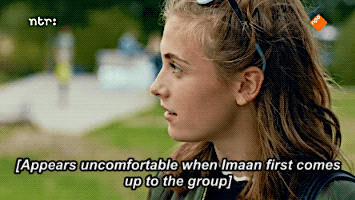
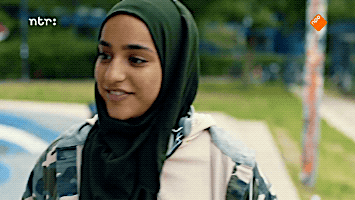
When Imaan first comes up to the group, Engel looks physically uncomfortable and confused. Even though she knows nothing about her, has not even known she existed before this scene. But she’s automatically made a judgement about Imaan. Consciously or not, her emotions are written all over her face.
Now, check out Imaan’s reaction. When she introduces herself she’s smiling, she looks excited. That is, until she notices Engel’s face. She even does a double-take. The smile falls off of her face; it’s like she’s gotten this reaction before and she’s already gearing herself up for some racist or Islamophobic remark.
2) Engel Makes A Snap Judgement About Imaan
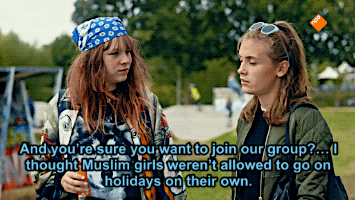
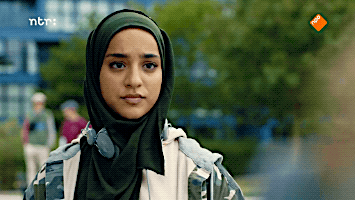
It looks like Imaan was right to gear herself up. Because immediately, Engel questions Imaan. Now, in Engel’s POV, this maybe looks like something sweet. A tentative ask, based off of the things she’s heard about Muslims.
But look at Imaan’s reaction before she makes her sarcastic comment. She looks hurt. She looks angry. She looks like she can’t fucking believe what this white girl just said to her, spouting off some stereotype that feels like it’s tied up in assumptions about Islam being sexist. Because here’s the thing: how is Imaan supposed to know exactly what Engel means by this statement?
As the audience, it’s easy to assume Engel means no harm. But how do we actually know that? We know nothing about her besides our socialization of innocent white womanhood. But as most PoC can tell you - white women are just as dangerous as white men are. And at this point, we - and Imaan - know nothing about Engel. None of us know if this was an intentional jab or simply trying to be polite or what.
3) Engel Is Clearly Uncomfortable About Imaan Being In Their Group
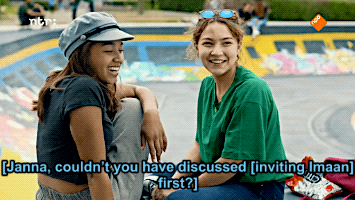
Now this is a small detail but it’s important: Engel specifically asks about Imaan joining the group after she and Janna walk away. As they go, it seems like they’re arguing a bit. We can’t know for sure, because this is Isa’s POV and they’re walking away. But there are a lot of implications behind this, including the one that Engel doesn’t feel comfortable about Imaan despite not knowing anything about her but her religion and her race. This small bit reinforces the idea that there’s something about Imaan that has Engel on edge. And as educated viewers, we should already know what it is.
4) Engel Continues to Make Assumptions About Imaan Based Off Of Her Race and Religion
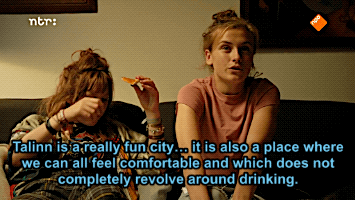
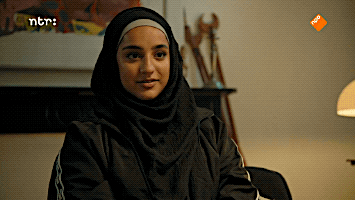
Engel explains that she chooses Talinn for the city trip because it’s a fun place that doesn’t revolve around parties. It’s clear in this scene that she’s pointedly talking to Imaan about that. And on the surface, this actually feels really sweet - she’s trying to be inclusive, trying to be understanding of restrictions (she assumes) Imaan has, being a Muslim. She’s being nice.
But again, let’s focus on Imaan’s reaction. She doesn’t look particularly pleased or grateful - in fact she seems mostly just confused. And as the video pans to Isa and Liv and an awkward silence ensues, I think it’s clear they feel the same as Engel. Something that might have been done in an effort to be respectful just seems to fall flat. Because it’s again based on assumptions, not based on anything that Engel actually knows about Imaan. She’s singling her out.
5) Out Of No Where, Engel Asks A Personal Question About Hijab
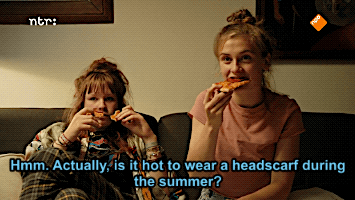
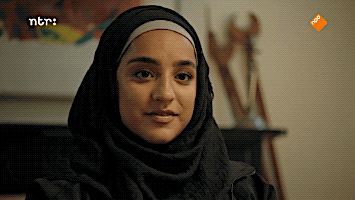
Seriously, this question... comes out of nowhere. It has nothing to do with what they’re talking about and it makes no sense to bring up. Imaan does seem to have a positive reaction to this though - after Engel compliments how pretty she looks, a small smile creeps onto her face. She seems pleasantly surprised that that was the follow-up to the original question. And I think with that small addition, it’s safe to infer this isn’t the first time she’s heard this - she already has the snappy “it’s hot in the summer anyway” response immediately. She’s used to people commenting on her hijab, and probably with her about it.
It’s honestly, probably what Imaan’s expecting, especially after the initial introduction. Because she can only base her responses on what she’s previously experienced with other white people - and she can only make assumptions based on those experiences. At least, until Engel surprises her. And Imaan seems genuinely okay with Engel’s response to her response, which is good. But it doesn’t stop the original question from bizarre in the context of their conversation.
Something that we should be asking is why it was important for Engel to ask that, in that moment? Why was it necessary for her to question Imaan about her hijab?
6) Engel Tries To Be Culturally Sensitive While Othering Imaan
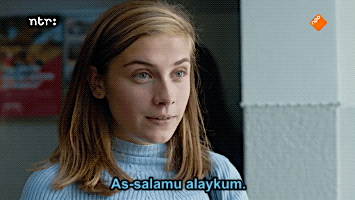
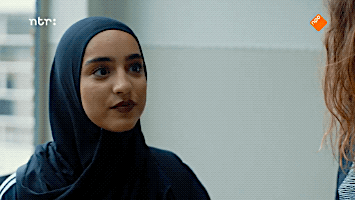
This scene, I feel really brings together the drive behind Engel’s Nice White Lady racism, and that’s the idea that she doesn’t really see Imaan as belonging. Again, this is something that seems nice, right? Engel made the effort to learn an Arabic, Muslim greeting to include Imaan. To make her feel welcome.
But look at Imaan’s response. She again just looks confused, and maybe a little amused, as she says “okay.” Because it’s actually very weird to speak to someone in a language that you have never heard them speak. It’s random and it’s weird, especially considering not once before this has Imaan spoken anything other than Dutch to Engel. Not once has she used an Arabic greeting or asked the others to do so.
7) Engel Openly Admits She Doesn’t Think Imaan is ‘Really’ Dutch
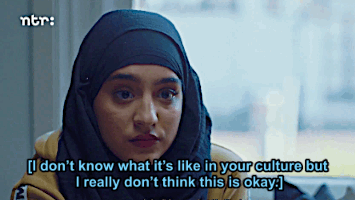
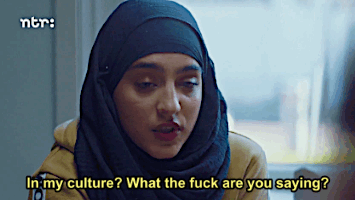
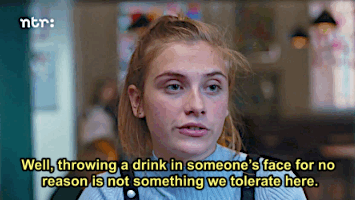
I think this scene is so powerful because it’s the culmination of the rest of Engel’s Nice White Lady racism. Because this is the root of the matter, isn’t it? Because although this isn’t even said cruelly, it’s said plainly. And it addresses all of Engel’s microagressions against Imaan thus far.
It’s the idea that Imaan isn’t one of us. Imaan doesn’t understand our culture. Imaan doesn’t belong here.
Imaan is an Other.
Engel's racism has been very subtle in that it continues to perpetuate the idea of Imaan as Other - as someone who, because of her race and religion, isn't really Dutch and isn't like Engel and the other girls.
Acknowledging that someone is going to have different customs, traditions, or belief systems because of their religious and ethnoracial background is important, of course! But in cases like this, it's a form of homogenization. It's indicating off the bat that Imaan - as a brown, Muslim woman - doesn't belong and make a lot of assumptions.
As we see in these scenes, it very well might feel like Engel really is "just curious" and attempting to be inclusive. I think there's an intention, on behalf of the writing staff, to give her a sort of ignorantly innocent air (as opposed to some of the open hostility we've seen from other Vildes). And Engel even admits it herself - she’s not trying to hurt Imaan.
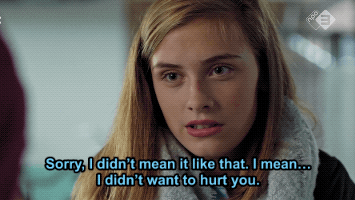
But I don’t think we should be lulled into seeing things only from the white woman's side. I've seen too many posts thus far that aren't even attempting to view things from Imaan's point of view. And if folks did try that, I think it would be much more obvious why she seems "so rude" in the face of Engel's microaggressions. Because when we look at Imaan’s reactions, I think it’s clear that they do affect her negatively. And they’re just some of the many, many racist and Islamophobic things she experiences every day.
And that's really the root of the matter; and why, in og Skam (season 4), the bench scene with Isak and Sana was straight up bullshit. Because the burden should not have to continually fall on marginalized people to meet everyone else where they're at. This is not to say asking questions when appropriate and/or encouraged is wrong. We only learn about our differences when we make the effort to educate ourselves. But it should not be the burden of marginalized folks to continuously answer unprompted questions, to continuously be nice to people who assume we don't belong, to continuously be picked at and prodded and have to defend ourselves.
And I'm tired of Good White People lecturing People of Color about how we should be nice and patient when the same kind of respect isn't given to us. Our lives are not after-school specials for white people to learn from. We are constantly asked to meet white people where they’re at - but white people rarely do any work to confront their own racial identities. They are rarely asked to think about how we are affected by their curiosity.
As far as Imaan knows, Engel is at best “ignorant but open” and at worse blatantly hostile. But regardless of which one it is, it makes me extremely uncomfortable to police how WoC react to the racism they experience, intentional or not, in order to defend white people. And I'm seriously hoping that of all the remakes, Skamnl is the one that addresses this. Because it's extremely fucked up to continue to ask WoC to cater to the emotions of white people, namely white women, because they're "trying." It's gross to ask us to put aside our right to be wary, our right to be annoyed, our right to be angry when faced with racism just because "you know she's just trying her best, right?"
I think the best comparison to this scene in the Skamiverses was in Druck, in the first scene that we meet Amira. The theater kids don't give her the flyer to help tutor refugee students because they take one look at her and assume that she's not German. That she's also a refugee, that she doesn't actually belong. And as good-intentioned as they may have been, their assumptions were still racist and Islamophobic. They were still stereotyping Amira based off of how she looked and without even speaking to her, already labeled her as Other.
And just like that was important to show - as was Amira and Hanna's reactions, confirming for the audience that this microaggression is occurring - I think it's important to also show Engel's brand of Nice White Lady racism. Because racism isn't always consciously done, it isn't always a physically violent act. But what Engel is saying is violence. And it is messed up. And it's a kind of racism that People of Color are constantly dealing with, especially from "allies" who think what they're doing is inclusive - when really all it's doing is perpetuating the idea that we are Other.
I'm glad that across the Skamiverse, the showrunners are showing different forms of racism in the Vildes. I really applaud Skamnl for taking the risk to show this sort of Nice White Lady racism and the subtle ways in which it has been affecting Imaan. But I also really hope that by the end of S1, Engel explicitly apologies for her actions. I also really hope that as viewers, some of the fandom isn’t so quick to continue to condemn Imaan and coddle Engel.
- mod Jennifer (11/1/2018)
71 notes
·
View notes
Text
When I first started hijab...
I still remember that when I first told my parents I wanted to wear the hijab, they were a bit hesitant for a number of reasons. I was young and lived in one of the most redneck states in the U.S. with a very small Muslim community. Anyways, after much convincing they agreed to allow me to start.
At the time, I used to play soccer competitively and I kind of just showed up to practice wearing the hijab. I was friends with all the girls on my team and although it must have been a shock for them to see me all covered up, none of them said anything. I could tell they were all too shy to ask and scared they would offend me, so I took the initiative to explain it to them the best I could. After that, some of the girls would carry around extra safety pins for me while others would wear longsleeves and long pants so I would feel more comfortable.
There is one memory of my hijab story that stands out in particular. It was the second-to-last game of the season and despite not having any issues in the previous matches, this particular ref decided that my hijab was a hazard and would not allow me to play. She gave me two options: either play without my hijab or to just sit out. And not wanting to create a whole scene, I decided to just sit out.
Looking back, I think my teammates were more upset and angry over it than I was. Many of them sat on the bench next to me, refusing to play while others argued with the ref. In fact the coaches and a few of my friends got so heated that the ref threatened to cancel the game altogether. Hearing all the commotion, the opposing team came to see what was going on and their response shocked me. All the players on the opposing team came to my bench and sat around me, refusing the get up and play until I was allowed. Despite not knowing me, these girls, who had driven 3 hrs from another state to play in this game, were standing up for me. Even though the game could have easily been played without me, they stood up for me and showed me (a complete stranger) so much respect. It got to the point where both teams were refusing to play and the crowd was beginning to get upset so the ref was forced to change her decision. When she made the call, all I remember is hearing the crowd cheering and players from my team and the opposing team coming up to hug me and give me high-fives. Even though my team ended up winning the match, the real win was what happened before the game.
To this day, I remember the warmth, love, and respect I felt on that day and it makes me tear up.
I wanted to share this part of my “hijab story” because many of you sisters have asked me for advice on starting hijab. All I can say is, make your intention for the sake of Allah and he will make the rest easier for you In sha Allah.
#This memory randomly came to mind so I thought I would share it#Alhamdulilah I am very fortunate that Allah made hijab easy for me#and I know that is not the case for everyone#so if you are struggling with hijab#I ask Allah to make it easier for you and reward you ten-fold for all the struggles you face#Ameen#hang in there sis ❤️#and if there is anything I can do for you#feel free to message me
56 notes
·
View notes